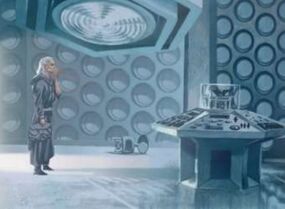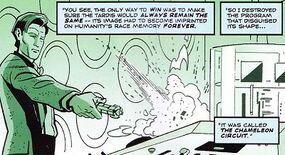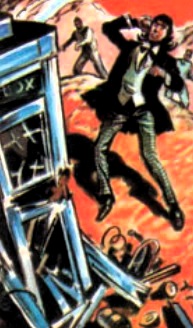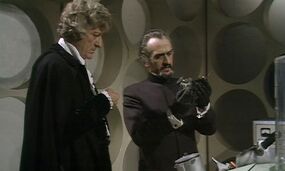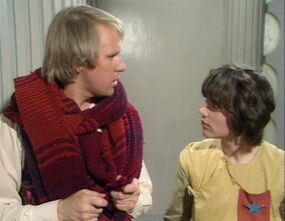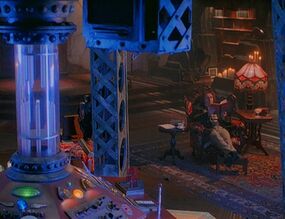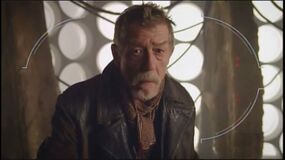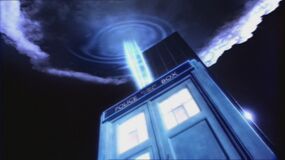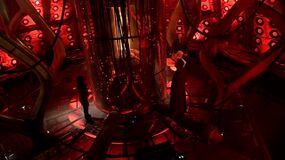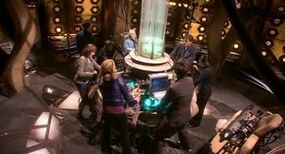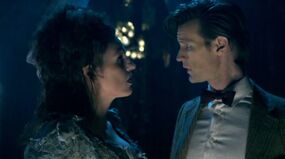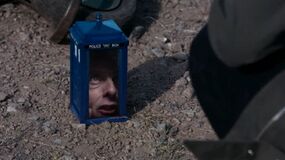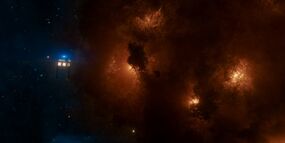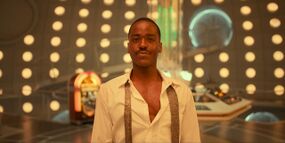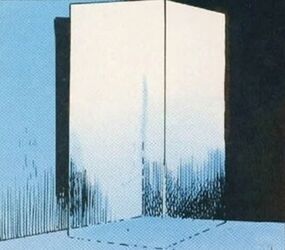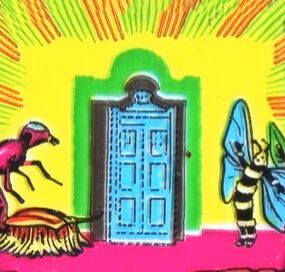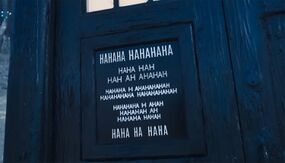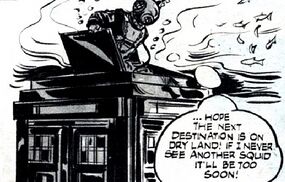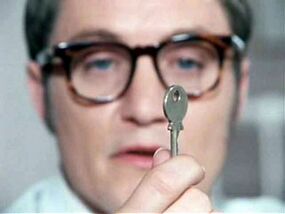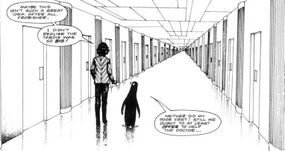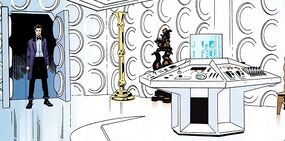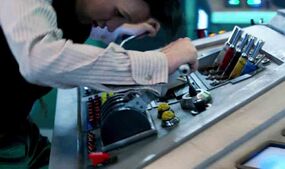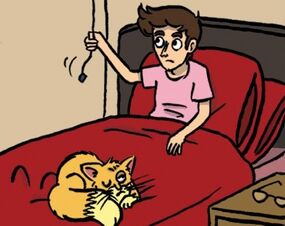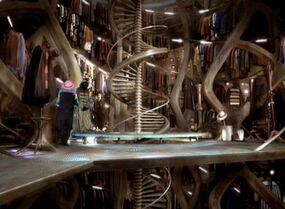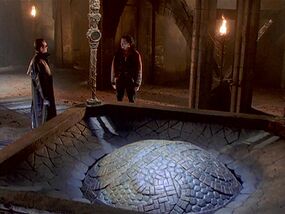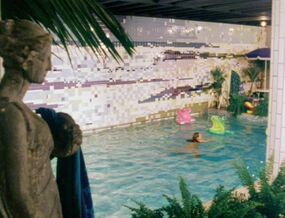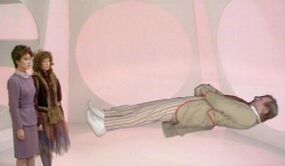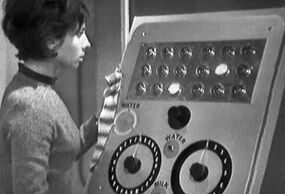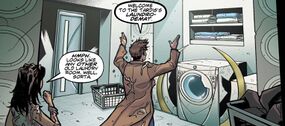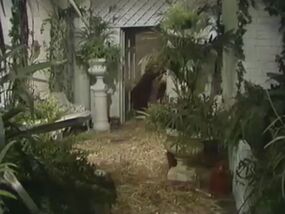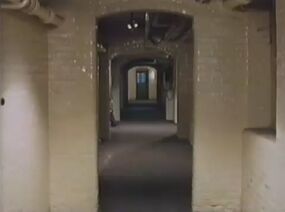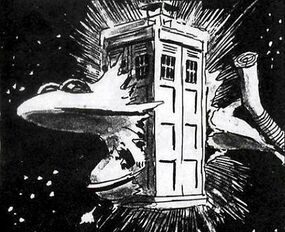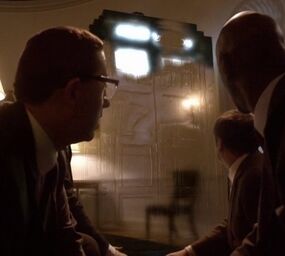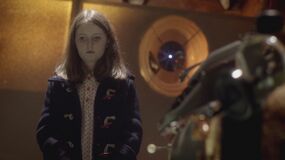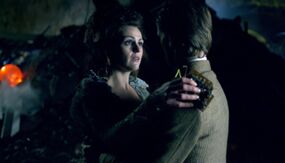The Doctor's TARDIS
- You may be looking for the Doctor's first TARDIS or TARDISes in general.
The Doctor's TARDIS — also called the Ship, the Box, and simply the TARDIS (PROSE: Time and Relative, COMIC: Food for Thought) — was the Doctor's primary means of transport. It was capable of travelling through space and time. The Doctor voyaged all across the universe in this vessel, from the Big Bang (TV: Terminus, Castrovalva, AUDIO: Slipback, PROSE: Nothing O'Clock) to the end of the universe, (TV: Utopia, Listen, AUDIO: The Chaos Pool, COMIC: Petals) and from the centre of the universe (TV: Terminus, Twice Upon a Time) to its outermost edges. (TV: Planet of Evil, Underworld) The craft was also capable of travelling between parallel realities, in spite of the fact that it was not specifically designed for inter-dimensional travel. (TV: Inferno, Rise of the Cybermen) Like all other TARDIS models, the Doctor's TARDIS was controlled via a central control console. (TV: An Unearthly Child, et al.)
Other Time Lords frequently characterised the Doctor's TARDIS as woefully out-of-date. (TV: The Claws of Axos, The Ribos Operation) Narvin called it "scrap", compared to his own Type 400. (AUDIO: The Quantum Possibility Engine) Indeed, by at least the time of the Fourth Doctor, if not earlier, the TARDIS model — called a "Type 40" — had been pulled from general service on Gallifrey, and replaced by more advanced models. (TV: The Deadly Assassin, The Invasion of Time)
The craft was prone to a number of technical faults, ranging from depleted resources (TV: An Unearthly Child, The Wheel in Space, Vengeance on Varos) to malfunctioning controls (TV: The Edge of Destruction) to a simple inability to arrive at the proper time or location. (TV: The Visitation, Attack of the Cybermen, The Eleventh Hour, Victory of the Daleks, The Girl Who Waited and many others) However, because the TARDIS was a living being, these "faults" may instead have been at least partially attributed to the manifestation of the ship's free will. Indeed, the TARDIS itself once told the Eleventh Doctor that while it may not have always taken him where he wanted to go, it had always taken him to where he needed to go. (TV: The Doctor's Wife) As the Twelfth Doctor knew her, the TARDIS was always "looking for trouble"; he loved her for it. (TV: Thin Ice)
As the centuries passed and all of the Doctor's companions came and went, the Doctor's faithful TARDIS remained their constant companion. Apart from the TARDIS, the Doctor only had memories. (AUDIO: Relative Dimensions) They shared an unbreakable bond, and the Doctor came to feel that in the end, it was just the Doctor and their TARDIS, travelling the universe together. (AUDIO: The Girl Who Never Was, TV: The Doctor's Wife) The Eighth Doctor thought of her as his oldest friend. (AUDIO: Wild Animals) Such was this bond, that, in an alternate timeline, the TARDIS eventually became the Doctor's final resting place, containing his personal time stream. (TV: The Name of the Doctor) The TARDIS eventually chose a name for herself, but she never revealed it to anyone, not even the Doctor (PROSE: Toy Story) who, for their part, referred to her as "Sexy". (TV: The Doctor's Wife)
The Doctor's TARDIS was depicted in many cultures on Earth in a variety of forms, such as being depicted as the temple of the household "gods", the Tenth Doctor and Donna Noble, by Lobus Caecilius's family after they were rescued from the destruction of Pompeii, (TV: The Fires of Pompeii) being painted on a church's stained glass window after the Doctor "smote [a] demon" at a convent in the 1300s, (TV: The End of Time) and the Eleventh Doctor using the power of its image to counter the influence of the Prometheans. (COMIC: Hunters of the Burning Stone) According to the Moment, the noise the TARDIS made when it appeared brought hope to anyone who heard it, no matter how lost they were. (TV: The Day of the Doctor).
River Song was known to steal the TARDIS when the Doctor was out. (TV: The Husbands of River Song)
Following the Fourteenth Doctor's bi-generation and the defeat of the Toymaker, the Fifteenth Doctor used his prize from the Toymaker’s game to duplicate the TARDIS into two, enabling one version of the TARDIS to stay with the retired Fourteenth Doctor whilst the Fifteenth Doctor used the other to continue travelling across time and space. (TV: The Giggle)
History
Procurement
Dubious origins
According to one account, the Ships on the Homeworld were born from the Matrix, whom they referred to as Mother. As part of a secret plan, Mother also conceived two hybrid offspring, twin sisters who were only half-Ship. When the time came for them to choose their Homeworlder pilots, one chose "the dangerous-looking one", and the other chose "the cuckoo". At this point, Mother expressed "complete resignation" with the latter Ship, realising that she had been wasting her time with her. (PROSE: Toy Story)
By most accounts though, the ship that would become the Doctor's TARDIS was one of 305 Type 40 TT capsules that had been manufactured. (TV: The Deadly Assassin) Like her sister ships, she was installed with the Record of Rassilon. (TV: State of Decay)
Both the First and Third Doctors implied he had built his TARDIS himself, (TV: The Chase, COMIC: Backtime) which the Twelfth Doctor mentally described, in hindsight, as an empty boast trying to impress "the apes" whom the Doctor had, in a way, looked down upon. (PROSE: Twice Upon a Time) A dissenting account claimed that this boast was genuine, and that the Doctor had been a genius mathematician whose unprecedented equations allowed him to conceptualise Space and Time into a single concept, the Idea of the Living Matter, based on which he had built the one and only TARDIS. (PROSE: The Equations of Dr Who) Graham O'Brien later told Thomas Edison that the TARDIS was "copyright: her". (TV: Nikola Tesla's Night of Terror)
Though many accounts instead depicted TARDISes as a class of vehicle common on the Doctor's homeworld, (TV: The Time Meddler, The Name of the Doctor, etc.) one of the Doctor's fellow Time Lords, the War Chief, still knew the Doctor as an expert in TARDIS engineering, who might be able, if he could be convinced to do so, to help him improve the flawed SIDRATs that the War Chief had given the War Lords. (TV: The War Games) The Eleventh Doctor indeed had the ability to build a TARDIS console from scratch. (TV: The Doctor's Wife)
One of the Seventh Doctor's repressed memories "from before he was born", (PROSE: Human Nature) thus relating to the early life of the Other, a semi-mythical figure from early Gallifreyan history who had helped raise the Gallifreyan civilisation into that of the Masters of Time, (PROSE: Lungbarrow) inspired John Smith to write the tale of The Old Man and the Police Box, wherein which the Doctor/Other had originally been an inventor from Victorian England who kept making alterations to his police box prototype until it had the ability to travel in time and space, at which point the old man decided to run away from Earth aboard his serendipitously-created Ship. Smith's account gave no indication of a hard break between the time traveller creating the Time Lord society and the life of the First Doctor, stating that the man eventually grew bored of the world he'd created and ran back to Earth aboard the same old police-box-shaped time machine. (PROSE: Human Nature)
However, by most accounts, the Doctor had actually stolen the TARDIS. The Doctor himself admitted this on many occasions. (TV: The War Games, Frontier in Space, Logopolis, Planet of the Dead, The Big Bang, The Time of the Doctor, Death in Heaven, COMIC: The World Shapers, AUDIO: The Beginning, Trial of the Valeyard, The Great War) a theft that the TARDIS, once she gained the ability to speak, with a humanoid body as anchor, described as mutual; wanting to see the universe, she had herself stolen a pilot to run away with, (TV: The Doctor's Wife) in line with the account that she had chosen him as her pilot. (PROSE: Toy Story)
Previous owners
If it had not been built by the Doctor, the TARDIS was previously owned by "several irresponsible owners" before the Doctor, (AUDIO: Collision Course) though accounts differed as to whether the last of them was Marnal (PROSE: The Gallifrey Chronicles) or Marianna. (AUDIO: The Abandoned) After Ulysses and Penelope Gate wiped Marnal's mind and deposited him in 1883 England, they took his TARDIS with them; (PROSE: The Gallifrey Chronicles) the Doctor once identified it as a "family heirloom". (PROSE: The Infinity Doctors) Susan suspected that the TARDIS had at one point been to Goliatha where a Golithan Spiney Back Beetle had found its way into the TARDIS control console. (AUDIO: The Hollow Crown) In one account of her first night aboard the TARDIS, Susan found evidence that led her to suspect it had once had a much larger crew who voyaged the cosmos in it. (AUDIO: The Beginning)
Some other accounts differed on the TARDIS's status prior to the Doctor's theft of it, and implied that it came from the general, government-controlled "stockpile" of TARDISes after the model had been officially decommissioned. (TV: The Deadly Assassin, PROSE: The Exiles, COMIC: Time & Time Again) The Fourth Doctor told Adric that "it was in for repairs on Gallifrey when [he] borrowed it." When Adric countered that he thought the Doctor outright owned the vehicle, the Doctor said, "Well, on a sort of 'finders, keepers' basis, yes." (TV: Logopolis)
The choice
The TARDIS was eventually withdrawn from service and set to be scrapped, the First Doctor suspecting that it had been already been decommissioned, (AUDIO: The Beginning) before it was "borrowed" by the Doctor and his granddaughter Susan in their escape from Gallifrey. Upon entering, the Doctor declared the TARDIS to be the most beautiful thing he'd ever seen. (TV: The Doctor's Wife)
When the Doctor first decided to leave Gallifrey, he had the chance to take a Type 53 but dismissed it as "soulless" in favour of the Type 40. (PROSE: Lungbarrow) Although he already possessed a Type 50 TARDIS the Doctor needed to leave Gallifrey in a "hurry," according to the Fifth Doctor, and he stole a different TARDIS instead of his first TARDIS. However, he made it clear that if things had gone differently during his escape, he would have taken the Type 50. (AUDIO: Prisoners of Fate)
By one account of the theft, Susan was one of Rassilon's descendants, Lady Larn, and had hidden herself aboard the TARDIS, electing to join the Doctor when he stole the craft. (PROSE: Birth of a Renegade) In another, the Doctor's only company when he boarded the TARDIS was the Hand of Omega which overrode the safeguards that forbade the ship from travelling into Gallifrey's past so that the Doctor, the reincarnation of the Other, could collect his granddaughter. (PROSE: Lungbarrow) In another, the Doctor had simply found the TARDIS and with no one claiming possession of it, he helped himself to it. (POEM: Something Borrowed, Something Blue)
In another account, in which Susan found the ship at the same time as her grandfather, the Doctor had not initially intended to take the Type 40, being persuaded to do so by a Gallifreyan echo of Clara Oswald. Detecting the breach into the repair shop, two Time Lord workers were surprised that anyone would steal a faulty TARDIS. (TV: The Name of the Doctor) In this account, the TARDIS engines were in the process of being dismantled by Quadrigger Stoyn, his face being badly burnt when the Doctor took off. (AUDIO: The Beginning) In another account, the TARDIS' former owner Marianna had been aboard. (AUDIO: The Abandoned)
The TARDIS' departure from Gallifrey caused a "commotion", one that the Eleventh General recalled witnessing. (PROSE: The Day of the Doctor) The Doctor's original TARDIS hired a Celestial Intervention Agency agent named Maris to locate the Doctor, angry at having been left behind in favour of an inferior model. Meanwhile, the Master and the Rani learnt of the Doctor's escape and became desperate to figure out where he had gone. (PROSE: Celestial Intervention - A Gallifreyan Noir)
The TARDIS herself said she was "a museum piece", though this may have been figurative. (TV: The Doctor's Wife)
None of these accounts precluded the possibility that the Doctor had somehow been responsible for its creation. Indeed, another account compromised between theft and creation. It claimed while the Doctor had not built the TARDIS from scratch, he had substantially modified/rebuilt it. According to this view, he achieved control of the TARDIS without using a direct mental link. This let him bypass the feature on most TARDISes which sent a tracking signal to the Time Lords. (PROSE: The Taking of Planet 5) As a result, while the Doctor still had a significant mental link with the TARDIS early in his travels, such as when the ship assisted him with his first regeneration, (TV: The Tenth Planet) he did not impose his will on it, allowing the TARDIS to go where it wished rather than exerting direct control. The TARDIS herself later stated that her unreliability to go where the Doctor wanted was due to her always going to where he was needed. (TV: The Doctor’s Wife)
These accounts notwithstanding, the most direct commentary on the Doctor's acquisition of the TARDIS came from the Doctor and the TARDIS itself. When the Doctor was summoned to be the defence counsellor to the Valeyard in his trial, he exclaimed to Inquisitor Darkel that he confessed to stealing a TARDIS and running away from Gallifrey. (AUDIO: Trial of the Valeyard) At a later point in the Doctor's life, when House transferred the soul of the TARDIS into Idris, the TARDIS gave its side of the story. She confirmed she had been out of commission, a "museum piece", when the First Doctor met her. She also confirmed that the Doctor had stolen her, denying the Eleventh Doctor's attempt to characterise the action as "borrowing". However, she also considered that she had stolen him, and had no intention of ever giving him back. She was unlocked, and deliberately let the Doctor in, because she wanted to explore the universe, and sensed he would be an ideal match.
The Eleventh Doctor recalled that upon first touching the console, the First Doctor said "[she was] the most beautiful thing [he'd] ever known". The TARDIS was shown to be very fond of him, admitting as Idris that she had always wanted to say a proper hello to him, but was unable to, as she was "not constructed that way". (TV: The Doctor's Wife)
First flight
By one account, after leaving Gallifrey, the TARDIS landed on Iwa where the Doctor and Susan first encountered the human race. (PROSE: Frayed)
In another, Stoyn shut down the engines with the Doctor managing to make an emergency landing on the moon of planet Earth, 450 million years prior to the human era. When Stoyn confronted the Doctor and Susan, the former destroyed Stoyn's homing device to prevent the Time Lords from finding them and removed the ship's dematerialisation circuit so that Stoyn could not maroon them. Exploring, the three met the Archaeons who removed the TARDIS' temporal stasis capacitor while the power was still on, breaching the stasis field and freezing everyone in the immediate area for 450 million years until the moon was colonised by humanity. In the interim, the TARDIS had recharged itself, Stoyn bargaining its power to the Archaeons when they came under attack from Earth. When Stoyn stepped outside to speak to the First Propagator, the Doctor and Susan returned to the ship, inserting the dematerialisation circuit and fleeing. The Doctor, after having seen a first contact video about humanity had hoped to visit Earth itself only for the ship to wind up on an alien planet. Reflecting on these events, Susan noted that the TARDIS wouldn't land on Earth for quite some time afterwards. (AUDIO: The Beginning)
In their travels, the Doctor and Susan came to regard the TARDIS as their home. (AUDIO: Tick-Tock World)
Arrival on Earth
The TARDIS eventually landed in London in the 1960s, coming to rest in I.M. Foreman's junkyard. (TV: An Unearthly Child) By one account, the Blessing Star had allowed the Doctor to properly pilot the ship to the destination, at the cost of burning out its navigation system. (PROSE: The Rag & Bone Man's Story) By another, the TARDIS had been placed there by the Father of Time, telling the Doctor and Susan that they would find "a new life" there. (COMIC: The Test of Time) In a third account, the Doctor had piloted the ship there himself, considering it a fine place to hide the TARDIS for a time. (COMIC: Untitled)
The ship's chameleon circuit disguised the ship as a police box fitting for 1960s London. However, when the TARDIS rematerialised roughly 100,000 years earlier, the ship's disguise failed to update and match the new surroundings, with the circuit apparently being broken. (TV: An Unearthly Child) The Eighth Doctor once claimed the circuit had been removed and repurposed to disguise the container of the Hand of Omega (AUDIO: The Shoreditch Intervention); according to another account, the Eleventh Doctor deliberately destroyed the circuit to make the ship retain the police box exterior, which would in turn ensure the ship's appearance became a part of humanity's race memory. (COMIC: Hunters of the Burning Stone) In any case, the ship's distinctive appearance was remembered across time: it was memorialised as part of the family of Lobus Caecilius' family gods, (TV: The Fires of Pompeii) and became the subject of conspiracy theorists including LINDA, (TV: Love and Monsters) Into The Unknown, (PROSE: Alabama's Blue Box) and The Blue Box Files. (AUDIO: SOS) The Doctor theorised the shape of the TARDIS had even paradoxically influenced the design of the London police boxes in the first place. (COMIC: Hunters of the Burning Stone)
Travels with the Doctor
For hundreds of years, the Doctor travelled through time and space in the TARDIS, along with numerous companions whom the ship regarded as "strays". (TV: The Doctor's Wife)
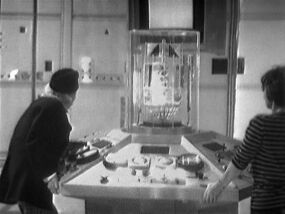
While living on Earth, Susan had enrolled herself at Coal Hill School. The various gaps in her knowledge worried two of her teachers, Ian Chesterton and Barbara Wright who followed her home on November 23rd 1963 and forced their way into the TARDIS when they heard her voice from inside it. Unwilling to allow humans to have knowledge of his ship, the Doctor dematerialised the ship with them aboard, arriving in Earth's caveman era. There the four united against the Tribe of Gum, making it back to the ship just before the tribe could deal a killing blow. (TV: An Unearthly Child) Though the Doctor attempted to return to London in 1963, the TARDIS instead brought the group to the planet Skaro, (PROSE: What the TARDIS thought of "Time Lord Victorious") knowing how important encountering the Daleks would be to the Doctor's character. (TV: Into the Dalek) After the Thal-Dalek battle, the Doctor attempted to use the fast return switch to return Ian and Barbara home only for the switch to become stuck and take the TARDIS to the beginning of a star system, the gravity fields nearly destroying it before the Doctor repaired the switch. (TV: The Edge of Destruction)
When the Doctor crossed paths with the Master on Destination, the Master claimed the Doctor's TARDIS as a substitute for his own. Having taken Ian and Barbara as hostages, the Master found himself overpowered, the humans managing to use the fast return switch to guide the ship back to Destination. (AUDIO: The Destination Wars)
On July the 20th 1966, the TARDIS was stolen by Edward Waterfield on the orders of the Dalek Emperor. Brought to Skaro, the TARDIS was held in the Dalek Emperor's chamber who threatened to destroy it unless the Second Doctor helped the Daleks isolate the Human factor. After discovering the factor and letting it loose in Dalek society, the Doctor and Jamie McCrimmon managed to return to the TARDIS, taking on Victoria Waterfield as a new companion. (TV: The Evil of the Daleks)
Following Victoria's departure and Zoe Heriot joining, the TARDIS was caught in the eruption of a volcano on Dulkis, the heat causing malfunctions in the fluid links. Unable to conventionally take off, the Doctor employed an emergency unit that sent the ship into the White Void. Once the repairs were complete, the Doctor tried to return to N-Space only for the ship to collapse and the three winding up in the Land of Fiction. Once they had defeated the Master Brain, the three returned to reality, the TARDIS reassembling around them. (TV: The Mind Robber) The TARDIS was heavily damaged during an encounter between the Doctor and a force of Asymmetrical Daleks on Zaos, but the Zaons and the Sky Ray Space Raiders helped him repair the time capsule, with Commander Clay contacting the Earth for new parts to use in the repair effort. (PROSE: Daleks Invade Zaos)
The TARDIS later landed in what the Doctor initially thought was World War I but discovered was a planet owned by the War Lords who sought to use brainwashed humans as an army. Though able to halt the plan, the Doctor was forced to call on the Time Lords to return the displaced humans to their own times. The Doctor tried to fly away from the planet before the Time Lords arrived only for the ship to be remotely operated from and brought back to Gallifrey. In his trial for the violation of the non-interference policy, the Doctor was exiled to 20th century Earth and the TARDIS was grounded. (TV: The War Games) The interference of the Celestial Intervention Agency led to a brief delay in this being enforced, (PROSE: A Brief History of Time Lords) with the Doctor working for them. On a mission one account claimed occurred during this time, (PROSE: World Game) the TARDIS was equipped with a Stattenheim remote control. (TV: The Two Doctors)
After the Doctor's full sentence was enforced, the dying Second Doctor was placed in the TARDIS, (COMIC: The Night Walkers) which delivered him, freshly-regenerated into the Third Doctor, to Earth for his exile. Afterwards the ship was rendered unable to leave Earth. (TV: Spearhead from Space) The Doctor made efforts to repair the ship, even removing the console from the control room, (TV: The Ambassadors of Death, Inferno, Terror of the Autons) but discovered the Time Lords had pre-programmed the TARDIS to return to Earth even if he did get her to move. (TV: The Claws of Axos) The Time Lords did direct the ship away from Earth on occasion to deliver the Doctor to missions on their behalf. (TV: Colony in Space, The Curse of Peladon, The Mutants) Following the First Omega Crisis, the Time Lords restored the Doctor's freedom, sending him a new dematerialisation circuit for the TARDIS. (TV: The Three Doctors)
At one time, the Third Doctor undertook a series of adventures in which the TARDIS had disguised herself as a red telephone box, (TV: The Future Is At Your Fingertips) but she later returned to the blue colour. (TV: Planet of the Spiders, et. al) The TARDIS was infected by Scratchman during his scheme to manipulate the Fourth Doctor into letting him into the universe, after being invaded by a scarecrow pursuing Sarah Jane Smith. This caused the interior to become dark and vines to grow from the walls and around the exterior via the windows. Whilst the ship was in this state the Doctor piloted it to Scratchman's universe through a tiny rift to rescue his companions. When the Doctor returned to the ship after defeating Scratchman he found the TARDIS still recovering, with the console currently being made of wicker. (PROSE: Scratchman)
At some point the Time Lords secretly installed a device to remotely pilot the TARDIS. (AUDIO: No Place Like Home) On numerous occasions, they directed the TARDIS so the Doctor would perform a task on their behalf, (COMIC: The Dalek Revenge, Virus, Treasure Trail, TV: The Brain of Morbius, AUDIO: Genetics of the Daleks) so that the CIA could retain plausible deniability. (PROSE: A Brief History of Time Lords)
After briefly landing in its domain, the TARDIS was exploited by the Mandragora Helix to enable its energy to reach Earth in the 15th century. Despite the Doctor defeating the helix energy, (TV: The Masque of Mandragora) the Mandragora retained a connection to the TARDIS. (COMIC: Distractions)
During the Sontaran invasion of Gallifrey, the Fourth Doctor retreated into the TARDIS interior, along with Leela, Andred, Borusa, Rodan and K9 Mark I, pursued by Sontarans. (TV: The Invasion of Time)
The Fourth Doctor attempted to use the TARDIS to stop the Skishtari elevating the village of Hexford, however they overpowered the TARDIS by using a wormhole to pull the village away from Earth. (AUDIO: The Hexford Invasion)
The TARDIS inadvertently materialised on Calufrax at the precise same time as the pirate planet Zanak, briefly preventing both vessels landing until Romana altered the ship's course slightly. The Doctor performed this manoeuvre again deliberately to stop Zanak materialising around Earth, buying time for the Mentiads to sabotage Zanak's engines, at considerable risk to the TARDIS. (TV: The Pirate Planet)
The TARDIS accidentally flew into E-Space after encountering a Charged Vacuum Emboitement. (TV: Full Circle) The Doctor was eventually able to pilot the ship back to the main universe via the Gateway. (TV: Warriors' Gate)
The Doctor attempted to have the Logopolitans repair the TARDIS' Chameleon Circuit, however the Tremas Master sabotaged their Block Transfer Computation causing the TARDIS exterior to shrink instead, leaving the Doctor trapped inside until he corrected the maths to return the TARDIS to normal. (TV: Logopolis)
The Master exploited Adric's gift of mathematics to use block transfer to force the TARDIS on a course for Event One. The Fifth Doctor was able to to avert disaster by jettisoning a third of the ship's interior, altering the TARDIS' course though he had sacrificed the ship's Zero Room, which he had been using to aid his recovery from his recent regeneration, in doing so. (TV: Castrovalva)
The ship was stolen from the Fifth Doctor by Thomas Brewster. (AUDIO: The Haunting of Thomas Brewster) With the aid of Adric, the Doctor was able to reclaim his ship. (AUDIO: The Boy That Time Forgot) Much to his anger, he found Brewster had sold off many key components during his brief travels in the TARDIS. (AUDIO: Time Reef)
Nyssa effected repairs to the chameleon circuit, which the Doctor decided to test by landing the TARDIS in an ocean. The TARDIS assumed the form of a whale however became convinced it actually was a whale, expelling the Doctor and Nyssa. The Doctor swam next to the whale and used his Time Lord heartbeat to make it remember its true nature and regain access to the ship to undo the repairs, returning the TARDIS to normal. (AUDIO: The Deep)
Whilst on Frontios beyond the frontier in time, the TARDIS was broken apart by a meteor storm caused by the Gravis. The Fifth Doctor tricked the Gravis into using its gravitational powers to put the ship back together. (TV: Frontios)
The Sixth Doctor attempted to repair the chameleon circuit. Though his repairs initially appeared successful, the ship eventually reverted back to a police box. (TV: Attack of the Cybermen)
By the time of the Seventh Doctor and Ace's travels, the Mandragora Helix energy aboard the TARDIS had grown strong enough to influence the TARDIS' flight, keeping it near Earth. (COMIC: Distractions) The Mandragora began using the ship as a bridge between 1990s Earth, where it was spreading via the drug Mandrake, and the Vortex. At the moment of the Mandragora manifesting fully on Earth however the TARDIS was able to jolt into gear, breaking the link with the Helix and foiling its plan, and materialised properly on Earth a few days later, happily surprising the Doctor as he'd feared the ship had been destroyed. (COMIC: The Mark of Mandragora)
Whilst in 1854 Crimea, the TARDIS was struck by a cannon ball which triggered the Hostile Action Displacement System and displaced the outer shell, resulting in the TARDIS retreating to the Time Vortex to grow a new shell whilst debris of its old one was left behind and used as firewood by soldiers. Having grown a new police box shell, which was white instead of the usual blue, the TARDIS subsequently honed in on the Doctor via his double heartbeat. (AUDIO: The Angel of Scutari)
Whilst in 1990s Perivale, the TARDIS was invaded by the Process. As it broke in, the TARDIS dematerialised and collided with a Time Scaphe, forcing the TARDIS to use the Banshee Circuits to survive becoming the SARDIT. After defeating the Process, the Doctor restored the TARDIS to normal however the ship had sustained a great deal of damage. (PROSE: Cat's Cradle: Time's Crucible) The Doctor was forced to use protoplasm from Tír na n-Óg to repair the ship's link to the Eye of Harmony, however an impurity contaminated the organic material. (PROSE: Cat's Cradle: Witch Mark) The impurity infected the ship and was able to prevent the Doctor taking action against it by exploiting his symbiotic link with the TARDIS. Eventually he linked the teritary console room with the Zero Room to isolate himself, enabling him to cleanse the TARDIS with the aid of Ace, who was able to help as she'd just spent some years away from the infected ship. (PROSE: Deceit)
The Seventh Doctor became separated from the TARDIS after it sunk in a tar pit on an alternate Earth in an unstable mini-universe. He recovered its alternate counterpart instead, using a time ram against his original TARDIS to destroy the mini-universe due to its impact on the lifespan of the main universe. (PROSE: Blood Heat) Unknown to him the TARDIS survived thanks to a Fortean Flicker and they were reunited at Bernice Summerfield's wedding. (PROSE: Happy Endings)
To rescue Sarah Jane Smith, Peri Brown and Ace from the Lobri, the Doctor piloted the TARDIS into humanity's collective unconscious, causing significant damage to the console room. (COMIC: Ground Zero)
Following the Master's trial, the Seventh Doctor was tasked with transporting his remains back to Gallifrey. (TV: Doctor Who) Managing to survive thanks to a Deathworm Morphant, (AUDIO: Mastermind) the Master damaged the TARDIS console, causing a critical timing malfunction, and forced it to make an emergency landing in San Francisco. The Master subsequently attempted to exploit the TARDIS' Eye of Harmony to steal the newly-regenerated Eighth Doctor's regenerations, at the cost of Earth, which was averted by Grace Holloway putting the ship into a temporal orbit. (TV: Doctor Who) This incident left a temporal cicatrix in San Francisco where the TARDIS had landed. (PROSE: Unnatural History) During the incident the Master fell into the Eye, (TV: Doctor Who) so the ship tried to break him down into pure energy, however he managed to reconstitute himself in a room deep within the interior. The TARDIS subsequently jettisoned the room with him still inside, leaving it adrift in the Time Vortex. (AUDIO: The Lifeboat and the Deathboat) An "echo" of the Master remained imprisoned in the singularity of the TARDIS' Eye of Harmony, (PROSE: The Gallifrey Chronicles) with River Song believing she heard an American screaming from within the walls whilst exploring the Eighth Doctor's TARDIS. (GAME: The Eternity Clock)
Following his resurrection into a new body, the Master found he had a symbiotic link to the TARDIS. The link enabled him to trail the Doctor for sometime without suspicion and to influence the TARDIS' flight, which he used to send the craft to times and places that would weaken the Doctor's self-belief and confidence ahead of what he believed would be their battle for the Glory. After Kroton won the true battle for the Glory, he cleansed the TARDIS of the Master's influence. (COMIC: The Glorious Dead)
After the temporal scar left in San Francisco began drawing creatures from other dimensions to the city, the Doctor materialised the TARDIS around it as a desperate measure to contain it. The Doctor and Sam Jones managed to seal the scar before the TARDIS was destroyed in the effort. (PROSE: Unnatural History)
After the Eighth Doctor was infected with Faction Paradox's biodata virus, (PROSE: Interference) the TARDIS took it into herself and worked to resolve the paradox now surrounding his third incarnation's regeneration. Whilst doing this, (PROSE: The Ancestor Cell) the ship was catastrophically caught in a rift between Earth and Avalon, which the Doctor believed destroyed the TARDIS. (PROSE: The Shadows of Avalon) In a desperate bid to survive, the TARDIS latched onto energy leaking from a bottle universe that President Romana had placed above Gallifrey, warping itself into the Edifice and escalating tensions with the Enemy who had been drawing on the same energy. As the War in Heaven loomed, the Time Lords sent the Doctor aboard the Edifice and he deduced its true nature, using its new weaponry to destroy Gallifrey as Faction Paradox exploited the Enemy's opening attack to overrun the planet. The Edifice collapsed in doing so, resolving the paradox at its heart and leaving it once again in the form of a police box, now the size of a matchbox. It was retrieved by Compassion who left it with the Doctor on Earth in the 19th century. (PROSE: The Ancestor Cell) The ship took a century to fully recover, after which the Doctor resumed his travels in the TARDIS. (PROSE: Escape Velocity)
The Eighth Doctor used the TARDIS to contain the explosion of an overloading cold fusion reactor, scorching the interior and cracking the Eye of Harmony slightly open. The Doctor subsequently repaired the Eye. (PROSE: The Gallifrey Chronicles)
The TARDIS was pulled into the universe of the Neverpeople after the Time Lords used the ship to turn Charlotte Pollard into a gateway to the universe, having underestimated the gateway's pull. The TARDIS honed in on the sole fixed planet and was later retrieved by the Doctor, who used the ship to follow the Time Station corrupted by anti-time that the Neverpeople planned to detonate on Gallifrey. He reconfigured the TARDIS so he could materialise around the station, containing the explosion. (AUDIO: Neverland) In doing so he and the TARDIS were both infected with anti-time, both developing a split personality of their usual self and a Zagreus persona. The TARDIS' Zagreus personality, appearing in an avatar based on Brigadier Alistair Lethbridge-Stewart was approached by Rassilon to make the Doctor embrace his Zagreus side to destroy the Divergence, and agreed to help him after using projections to view the history of the Divergence alongside Charley. To break the Doctor, the Zagreus TARDIS expelled Charley from the interior and had the police bos exterior melted down in front of him. Charley and three projections created by the loyal TARDIS persona overpowered the Zagreus avatar, pushing him into the cauldron with the smelted exterior. This reunited the TARDIS' personalities and enabled the ship to use the Brigadier avatar to help Charley stabilise the Doctor. (AUDIO: Zagreus)
Upon entering his self-imposed exile in the Divergent Universe, the Eighth Doctor became separated from the TARDIS. (AUDIO: Scherzo) He found the ship at Caerdroia and subsequently used it to explore the Divergent Universe, (AUDIO: Caerdroia) until he found a way to pilot her back to the main universe. (AUDIO: The Next Life)
Following them transporting the Doctor to Orbis after he fell off a cliff fighting Morbius, the Sisterhood of Karn kept the Doctor's TARDIS until the ship was retrieved by the Headhunter, who used it to pick up Lucie Miller and reunite her with the Doctor. After the destruction of Orbis, the Doctor resumed his travels in the TARDIS. (AUDIO: Orbis)
On Parrak the TARDIS was attacked by the Ravenous, critically draining the ship's energies. (AUDIO: Planet of Dust) The Ravenous subsequently transported the TARDIS with them to the Crucible of Souls as a trophy. The Doctor, Liv Chenka and Helen Sinclair recovered the TARDIS and flew it on what the Doctor believed may be its final flight. (AUDIO: Day of the Master) They crashlanded in London 2020, however the damage prevented time crystallising around the TARDIS as usual, fracturing the timelines. (AUDIO: Crossed Lines) The interior collapsed, with the Doctor, Liv and Helen escaping just in time, (AUDIO: Lost Property) and the TARDIS reverted to a normal police box until a nearby paradox caused by the Rarkelians killing the Doctor, which the ship latched onto to begin restoring itself and resurrect the Doctor. (AUDIO: Divine Intervention) Whilst initially only able to move in time, (AUDIO: Dead Time, UNIT Dating, Baker Street Irregulars) the TARDIS eventually regained the ability to travel in both time and space. (AUDIO: Patience)
During the Kotturuh crisis, the Dalek Time Squad intercepted the Eighth Doctor's TARDIS and attached it to the engines of their saucer, allowing them to travel back to the Dark Times. (AUDIO: The Enemy of My Enemy) After the Defence of Gallifrey, the Doctor managed to reclaim his ship and return to his time. (AUDIO: Mutually Assured Destruction)
Last Great Time War
Initially refusing to fight in the Last Great Time War, the Eighth Doctor used his ship to rescue innocents who were caught in the crossfire. With knowledge of Time Lords becoming more commonplace in the universe, the TARDIS came to be seen as an omen of evil. (PROSE: The Day of the Doctor)
After being caught in the destruction of the Theseus, (AUDIO: The Starship of Theseus) the TARDIS fell on a planet devastated by temporal warfare, causing the ship's interior to retreat to protect itself from the distortion. A group of refugees led by Bliss found the empty police box shell, and their amnesiac Dalek guide insisted they bring it them to a safe zone on the planet. There the Doctor reunited with the group and his ship, but they were captured by Time Lord forces led by Cardinal Ollistra. (AUDIO: Echoes of War) She had the TARDIS brought with them to the base on the Moon of Tenacity but opted not to expediate its recovery from exposure to temporal distortions, as the Doctor had been conscripted so was unlikely to need it. (AUDIO: The Conscript)
As a result the ship had barely started to recover when the Daleks invaded, only being able to transport the Doctor, along with the refugees and Ollistra, in space. The Doctor managed to fly the ailing ship away from Tenacity and through a quantum wall of Dalek saucers, however crash-landed on Jedris as a result. The ship and the Doctor were lost in the shifting landscape when the Time Lord forces coming to Ollistra's rescue accelerated time as they battled Daleks, however both were saved by Quarren Maguire who used his powers to alter reality to retrieve them and leave Bliss onboard. (AUDIO: One Life) By being in the TARDIS, Bliss was protected from subsequent rewriting of Derilobia's timeline that should have erased her from history. (AUDIO: The Lords of Terror)
The TARDIS later arrived on Gallifrey piloted by the Doctor Ogron. Confirming that the Doctor's DNA and memory engrams existed in the hybrid, the Time Lords put the Ogron in the Twelve's custody who brought him to the Eighth Doctor. When the Ogron convinced the Doctor to travel to the Planet, the TARDIS was cloaked only to be recalled when it was discovered that the Doctor Ogron's existence was a bootstrap paradox, being used to send the younger version to Gallifrey to complete the loop. (AUDIO: Planet of the Ogrons) The Doctor subsequently retrieved the ship from Gallifrey. (AUDIO: State of Bliss)
Following the Daleks being wiped from N-Space, the Doctor left his TARDIS on a Gallifreyan outpost when needing to break through the time lock around Grahv, instead taking, and crashing, Tamasan's TARDIS which was capable of the task. (AUDIO: The War Valeyard) He later retrieved his ship after helping the Time Lords identify their forgotten enemy, (AUDIO: Dreadshade) then escaping in it with Bliss and a copy of his grandson Alex Campbell after the Daleks were restored to the universe. (AUDIO: Restoration of the Daleks)
After swapping his and the Doctor's bodies, the War Master stole the TARDIS. (AUDIO: The Castle of Kurnos 5) He had several "diabolical" adventures, before setting up camp on Nastrum. There the Doctor caught up with him and reclaimed his body and TARDIS. (AUDIO: The Cognition Shift)
During the Fifth Segment of the conflict, (PROSE: The Stranger) the Doctor failed to rescue Cass Fermazzi, crashing on the planet Karn where the Sisterhood convinced him to join the conflict. Accepting their reasoning, the Doctor regenerated into his ninth incarnation. (TV: The Night of the Doctor) Though openly identifying as a warrior, the new Doctor refused to allow weapons to be installed on his TARDIS, insisting that it be left as it was. (AUDIO: Light the Flame) Over the course of the conflict, the War Doctor modified the TARDIS to respond to his screwdriver's signal. (AUDIO: The Thousand Worlds, The Heart of the Battle) Whilst working with Veklin, the Doctor was forced to use a Battle TARDIS instead of his own, however he destroyed this ship in an effort to stop a Dalek harvester. (AUDIO: Saviour)
In a desperate attempt to save Lacuna from a raid of Berserker Daleks, the Doctor used the TARDIS to create a time loop of the final day before the planet was wiped out. Over hundreds of loops he tried and failed to find a way to save the people until he was persuaded to break the loop and leave by Ignis Abel. (AUDIO: Rewind)
During the Barber-Surgeon's campaign, the TARDIS was attacked by one of the Barber-Surgeon's creations whilst transporting the Doctor to prehistoric Earth. Upon landing, the ship was left dead. (AUDIO: The Abyss) After the Barber-Surgeon was erased from existence the TARDIS was restored and was subsequently reunited with the Doctor by the General. (AUDIO: The Horror)
When the Doctor protested President Rassilon's plan to stop the Eternity Circle, he was exiled once again, the TARDIS being sent to die in the under croft with its clearance codes revoked. When the Doctor and Cinder reclaimed the ship, the Castellan allowed the ship to take off, the two stopping Partheus from deploying the Tear of Isha on the Tantalus Eye before they travelled to the Death Zone. There, the Doctor collected Borusa, since rewired into a possibility engine, and brought him to the Tantalus Spiral, the former President of the High Council being able to use his powers to remove Dalek influence from the sector. Despite the victory, the Doctor was left appalled at the lengths that the High Council had been prepared to go and swore to end the war. (PROSE: Engines of War)
On the last day of the War, the War Doctor walked from away the ship as he planned to detonate the Moment, which the sentient superweapon suspected was because he didn't want her to see him perform such a deed. The Moment summoned the Tenth and Eleventh Doctors to show the War Doctor what such a choice would turn him into. Though the War Doctor was initially convinced to double down on his initial idea, Clara Oswald convinced the Doctors to "be a doctor" and find an alternative. Inspired by their recent adventure with stasis cubes, the Doctors decided to shunt Gallifrey into a parallel pocket universe. Summoning "all thirteen" of themselves, the Doctors flew their versions of the TARDIS into Gallifrey's lower atmosphere and saved their homeworld from the Dalek Fleet. Countless more versions of the TARDIS from across its timeline were also summoned to Gallifrey, all helping to teleport the world away and save the planet from the fallout of this. (TV: The Day of the Doctor, PROSE: The Day of the Doctor)
In another account of the end of the Time War, after the Eighth Doctor used the Moment to destroy Gallifrey Original, the TARDIS was responsible for retrieving him as the Time War time lock containing the Time War timeline solidified, saving him from tumbling out of existence. (PROSE: Doctor Who and the Time War)
Post Time-War
As a result of the timelines being out of sync, the Doctor was unable to retain the knowledge of the Time War's true conclusion, (TV: The Day of the Doctor) believing that he had destroyed Gallifrey (TV: Dalek) and coming to consider his TARDIS to be the last of her kind. (TV: The Doctor's Wife)
After Rose Tyler caused a paradox by changing history by saving her father from a fatal car accident in view of her recent past self, the TARDIS retreated from the wound, becoming a police box. The Ninth Doctor attempted to reconnect with the interior by energising the key with a phone battery, but was interrupted by Reapers. When Rose's father corrected the timeline, the TARDIS returned to normal. (TV: Father's Day)
After landing in Cardiff to use the rift to refuel the TARDIS, the Ninth Doctor captured Blon Fel-Fotch Passameer-Day Slitheen and confiscated her tribophysical waveform macro-kinetic extrapolator. As Jack Harkness worked in the TARDIS, the extrapolator identified it as an alien power source and, as Blon had programmed, locked on and used it to open the rift, Blon's ultimate intention being to destroy the planet whilst she used the extrapolator to escape. However, the stress caused the heart of the TARDIS to be exposed, regressing Blon to an egg and so giving her a second chance at life. (TV: Boom Town) Jack would later indicate that the TARDIS' presence resulted in the invisible lift used by Torchwood Cardiff. (TV: Everything Changes)
After visits to Raxacoricofallapatorius and Kyoto in 1336, the TARDIS was penetrated by a transmat, dispersing the Doctor, Rose and Jack across the Game Station whilst the TARDIS itself was stored in Archive Six. As the Doctor learnt, this was done by the Controller acting in defiance of her masters, the Daleks. With Rose held aboard the Dalek Flagship (TV: Bad Wolf) the Doctor and Jack used the TARDIS to retrieve her, with the new power of the extrapolator protecting it from the firepower of both the Daleks and their ship.
Back aboard the Game Station, the Doctor deceived Rose into entering the TARDIS before sending it away to return her home; leaving a message for Rose, the Doctor anticipated his death and instructed Rose to leave the TARDIS to die rather than fall into enemy hands. Refusing to leave the Doctor to his fate, Rose enlisted Mickey and Jackie's assistance to open the heart of the TARDIS. This resulted in Rose absorbing the energy of the vortex, transforming her into the Bad Wolf, granting her the power to resurrect the slain Jack whilst wiping out the Dalek Fleet. To save Rose's life, the Doctor absorbed the energy into himself before returning it to the TARDIS before departing, leaving Jack aboard the Game Station.
As a result, the Doctor regenerated into the Tenth Doctor who, (TV: The Parting of the Ways) in his delirium, caused the TARDIS to crash land as he attempted to take Rose home for Christmas. (TV: Children in Need Special) Later, the now unconscious Doctor was taken to the TARDIS which was teleported to the invading Sycorax ship, the Sycorax identifying it as a "clever blue box". It was here that the Doctor awoke, which he attributed to spilt tea, leading him to his confrontation with the Sycorax leader. (TV: The Christmas Invasion)
After falling through a crack in the Time Vortex, the TARDIS crash landed on a parallel Earth and lost all power due to being in an alien universe. The Tenth Doctor gave up a decade of his lifespan to recharge the last active power cell, (TV: Rise of the Cybermen) which after 24 hours enabled the TARDIS to return to its proper universe. (TV: The Age of Steel)
The Tenth Doctor and Martha Jones were separated from the TARDIS at Wester Drumlins in the 2000s[nb 1] by four Weeping Angels, who wanted to feed on the energies within the ship. With the Doctor's guidance via recordings and messages, Sally Sparrow and Larry Nightingale reached the ship and inserted a DVD designed by the Doctor into the console causing the ship to dematerialise around them, en route to 1969 where the Doctor and Martha were trapped, in doing so trapping the four Angels in each other's gaze as they'd surrounded the TARDIS prior to its departure. (TV: Blink)
Ending up at the end of the universe after it attempted to shake off the fixed point in time of Jack Harkness, the ship was stolen by the Saxon Master. (TV: Utopia) He used it to make contact with the Toclafane, accompanied by Lucy Saxon, and converted it into a paradox machine to enable the Toclafane to enslave their ancestors on Earth in 2008. After sustaining the paradoxical invasion for a year, the paradox machine was destroyed by Jack, returning time to normal. The Doctor subsequently reclaimed and repaired the TARDIS, (TV: Last of the Time Lords) though in doing so left its shields down resulting in it colliding with its own younger self piloted by the Fifth Doctor and then the Titanic. (TV: Time Crash)
During the Sontaran invasion of Earth, the Sontarans captured the TARDIS, unaware that Donna Noble was still aboard. Donna was able to infiltrate their ship and work with the Doctor to rig the teleport to return the ship to Earth. (TV: The Poison Sky)
Whilst the ship was parked in 2009 Chiswick, the Collectors found and stole the TARDIS, kidnapping Donna as well as her friend Nat due to believing her to be the pilot. (AUDIO: Out of this World) The Collectors subsequently studied the ship and forced Donna to pilot it by threatening Nat. She managed to fly it to Valdacki, (AUDIO: Spinvasion) though the Doctor later theorised this flight was actually due to the Collectors triggering Hostile Action Displacement System. (AUDIO: The Chiswick Cuckoos) Whilst Donna tried to pilot the TARDIS back to Chiswick, the TARDIS located a book of piloting hints the Doctor had lost in the Middle Ages and took them there, initiating Emergency Program Twelve. Following the Emergency Program, the TARDIS used a hologram to help Nat, taking the form of her husband Garrison. After retrieving the book, Donna and Nat managed to fly the TARDIS towards Chiswick, (AUDIO: The Sorcerer of Albion) with some psychic guidance from the Doctor. Afterwards the Doctor set about repairing the damage the Collectors and Donna's escapades had done to the TARDIS. (AUDIO: The Chiswick Cuckoos)
The New Dalek Empire attempted to destroy the TARDIS with Donna aboard by throwing it into the core of the Crucible, having taken its defences down with a chronon loop. The ship was saved when a meta-crisis between Donna and the Tenth Doctor's severed hand, infused with regeneration energy, created a new Doctor who piloted the ship to safety. After the Dalek Empire had been destroyed, the Doctor used the TARDIS to return Earth to its proper point in space, using energy from the Cardiff Space-Time Rift lopped around the ship by Mr Smith as a “tow rope”, and had the ship fully manned for the first time by his assembled companions, the Children of Time. (TV: Journey's End)
The TARDIS was blocked from materialising by the Trickster when the Doctor attempted to intervene in his scheme to entrap Sarah Jane Smith. The Doctor finally managed to land the ship in time to interrupt her wedding, but was separated from her when the Trickster trapped the wedding into separate seconds. Using artron energy to combat the Trickster, the TARDIS managed to hone in on the Doctor but was unable to stay long enough to retrieve the rest of Sarah's gang. (TV: The Wedding of Sarah Jane Smith)
Spending time in a snowy mountain, the Doctor returned to the TARDIS to find it buried in snow. The Doctor strapped some nearby reindeer to the TARDIS, turning it into an impromptu sleigh as he rode the TARDIS through the sky. (TV: The Doctor and the Reindeer)
The TARDIS sensed Majenta Pryce's connection to the Crimson Hand and so resisted the Doctor's efforts to take her to Panacea to restore her memories of her past. When it appeared he might actually take Majenta there, the TARDIS let Intersol capture them. When she faked killing the Doctor for the Hand, Majenta sent him and the TARDIS into their own pocket dimension and later retrieved them when the Morass began consuming reality. (COMIC: The Crimson Hand)
On Mars in 2059, the Tenth Doctor used Gadget to pilot the TARDIS to Bowie Base One to rescue the surviving crew, changing history. (TV: The Waters of Mars) The TARDIS subsequently observed the Time Fracture his meddling had created and made preparations for the journey the ship knew the Doctor was about to undertake to the Dark Times, giving Brian, an Ood who had fallen into the Time Vortex, a nudge there in belief he might be useful to the Doctor. (PROSE: What the TARDIS thought of "Time Lord Victorious") Whilst travelling in the Dark Times on the last ship of the Victis Fleet, the Doctor connected the TARDIS to supply power due to the ship having taken damage in the Battle of Mordeela. (AUDIO: The Minds of Magnox, PROSE: All Flesh is Grass)
The Doctor's regeneration into the Eleventh Doctor caused considerable damage to the TARDIS control room, (TV: The End of Time) leading it to fly erratically through the skies of London before crashing in Leadworth in 1996, where the Doctor met Amy Pond. In an attempt to stablise the TARDIS, the Doctor made what was intended to be a five minute jump but ended up travelling forward twelve years. After facing Prisoner Zero and the Atraxi, the Doctor returned to the TARDIS, which had changed its exterior and console room. After a brief trip in the "new TARDIS", the Doctor caught up with Amy, finding that he had went forward two more years. Ultimately, Amy joined the Doctor in the TARDIS. (TV: The Eleventh Hour)
With Amy trapped onboard, the TARDIS became stuck in a materialisation loop when trying to land in Colchester due to the nearby malfunctioning time machine. The TARDIS was finally able to materialise when the Doctor and Craig Owens shut down the malfunctioning ship. (TV: The Lodger)
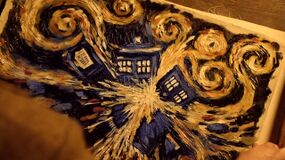
Within a Silurian city, the Doctor found a crack in time through which he caught a piece of the TARDIS shell whilst the TARDIS at present was intact, much to his shock. (TV: Cold Blood) It later became apparent that the TARDIS would explode, as depicted in Vincent van Gogh's The Pandorica Opens, resulting in the destruction of the universe. Believing the Doctor to be responsible, an Alliance of numerous species assembled to stop him by imprisoning him in the Pandorica, only for an unknown force to take control of the TARDIS, which exploded with River Song aboard. This caused a total event collapse (TV: The Pandorica Opens) which threatened to destroy the universe whilst the Earth persisted as the eye of the storm; though its sun was now gone, the perpetual explosion of the TARDIS took its place. The TARDIS' emergency protocols sealed off the control room and putting it in a time loop, allowing for River to be retrieved by the Doctor who used the Pandorica to reboot the universe in what he called Big Bang Two. (TV: The Big Bang) The Doctor later learnt that the Kovarian Chapter of the Silence were responsible for the explosion of the TARDIS, having travelled back in an attempt to prevent the Doctor's arrival at Trenzalore, only to create the crack in the universe which would lead to Gallifrey, forming a destiny trap. (TV: The Time of the Doctor)
After the Doctor left Amy and Rory on their honeymoon, the TARDIS was stolen by a rogue faction of Shansheeth who sought to use it in a crusade to avert death. They attempted to use the memories of Sarah Jane Smith and Jo Jones to create a key to access the ship with a memory weave however the pair overloaded the machine, after which the Doctor reclaimed the TARDIS. (TV: Death of the Doctor)
After being lured to a bubble universe by House, the TARDIS' soul was removed from the ship and placed in the body of a human, Idris. House possessed the ship, departing for the main universe and abandoning the TARDIS and the Eleventh Doctor. Working together, during which they talked properly for the first time, the TARDIS and the Doctor made a make-shift TARDIS console and pursued House, tricking him into moving them to the control room. There Idris' body failed, releasing the TARDIS matrix who was able to reclaim her body from House. Afterwards she briefly communicated with the Doctor again in Idris' form, saying a tearful "hello", before returning to normal. (TV: The Doctor's Wife)
By one account that showed the Time Lords as having been destroyed at the conclusion of the Time War, the Matrix had become sentient when all of Gallifrey died and uploaded itself to the Doctor's TARDIS to survive the planet's destruction. Resurfacing in the Eleventh Doctor's lifetime, the Matrix attempted to take control of the TARDIS, its conflict with the ship's own consciousness creating a miniature world within the ship itself before the Doctor and Clara Oswald trapped the artificial intelligence in a never ending wormhole. (COMIC: Sky Jacks)
To try and help Clara bond with the TARDIS, the Doctor opted to teach her how to pilot it, setting it to basic mode. Unfortunately this coincided with the Van Baalen salvage ship extending its magno-grab. The Doctor attempted to break free, succeeding when a future version of himself from an alternate timeline tossed him the magno-grab remote, shutting it down. (TV: Journey to the Centre of the TARDIS)
When the Siege of Trenzalore broke out, the Doctor tricked Clara Oswald back home, though he intended for the TARDIS to return to him. Discovering the ruse in time, Clara grabbed the TARDIS as it was taking off, delaying it by three centuries as it extended its force field to protect her. After the Siege had devolved into an open war, the Doctor managed to send Clara home, though this time bringing the TARDIS back to Trenzalore where it sat for six centuries. The TARDIS was then used by Tasha Lem to collect Clara so she could comfort the Doctor, now out of regenerations and finally dying. Clara however managed to convince the Time Lords to grant the Doctor more lives, him using the excess regeneration energy as a final weapon to defeat the New Dalek Paradigm. With the Siege over, the Doctor and Clara returned to the TARDIS and resumed their travels, the Doctor regenerating into the Twelfth Doctor. (TV: The Time of the Doctor)
In his delirium, the Twelfth Doctor forgot how to pilot the TARDIS, leading to it falling into the mouth of a Tyrannosaurus rex which was displaced to Victorian London, where it regurgitated the TARDIS. In the Glasgow of her time, Clara received a call on the TARDIS phone from the Eleventh Doctor who, just prior to his regeneration, convinced her to stay with his future self. (TV: Deep Breath)
When the Boneless invaded N-Space, they leeched energy from the TARDIS, most notably shrinking its exterior dimensions. Clara was eventually able to trick the Boneless into firing dimensional energy through a wall and into the TARDIS, allowing the Doctor to fire a pulse from the ship that sent the invaders back to their own realm. (TV: Flatline)
Shortly after Clara Oswald's death, the Doctor was teleported into his confession dial. Left in Rigsy's care, the TARDIS was painted with a memorial for Clara. (TV: Face the Raven) Emerging from the dial on Gallifrey, the Doctor made use of Extraction chamber 7 to save Clara, stealing a new TARDIS to escape the planet. When a neural block erased the Doctor's memories of Clara, she claimed the second TARDIS as her own, reuniting the Doctor with his ship in Utah. (TV: Hell Bent)
When the Twelfth Doctor spent seventy years as a professor at St Luke's University, the TARDIS was parked in his office. (TV: The Pilot)
When the Twelfth Doctor regenerated into the Thirteenth Doctor, the TARDIS was left severely damaged by the regeneration energy. (TV: Twice Upon a Time) Damaged and pilotless, the TARDIS crashed on Desolation. Stuck in a looping materialisation, the TARDIS became known as "the ghost monument" in the planet's culture before it was recovered by the Thirteenth Doctor, having repaired itself from the damage. (TV: The Ghost Monument)
After crossing paths with Ashad in 1816, the Doctor and Team TARDIS followed him to the far future, leaving the TARDIS far from the battle that was to come. (TV: Ascension of the Cybermen) At its conclusion, the Doctor stole another TARDIS to bring her back to her own. Before she could take off, the Judoon teleported in and arrested the Doctor, teleporting her to a Judoon prison. (TV: The Timeless Children) Twenty years later, the Doctor was broken out by Jack Harkness, the two teleporting back to the TARDIS. (TV: Revolution of the Daleks)
When the Flux ravaged the universe, the Thirteenth Doctor threw the TARDIS in its path. (TV: The Halloween Apocalypse) Though this caused several system malfunctions in the TARDIS, (TV: War of the Sontarans) it did prevent the Flux from consuming the universe. (TV: Survivors of the Flux) A week after this, the Doctor, for the first time ever, reset the TARDIS' systems, repairing the damage that the Flux had done. This caused a time loop which enabled the Doctor and her companions to escape death at the hands of Dalek Executioners. (TV: Eve of the Daleks)
After the Spy Master took possession of the Doctor's body via forced regeneration, he took the TARDIS for himself. The ship appeared to resist him, shocking him when he touched the console, however he threatened to throw her on the scrapyard if she didn't comply. Yaz forced him out of the TARDIS and piloted the ship herself until she restored the Doctor. When the Doctor saw that she was about to regenerate, she and Yaz shared some ice cream atop the TARDIS before the Doctor deposited Yaz back on Earth. (TV: The Power of the Doctor [+]Loading...["The Power of the Doctor (TV story)"])
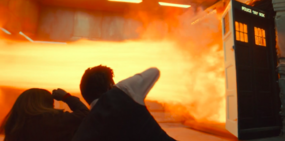
Following the Thirteenth Doctor's regeneration, the TARDIS changed the interior greatly, apparently on its own, before the Fourteenth Doctor returned with Donna Noble. However, Donna accidentally spilled coffee on the console, sending the TARDIS flying out of control. (TV: The Star Beast [+]Loading...["The Star Beast (TV story)"]) The TARDIS flew out of control to a variety of times and places, (COMIC: Untitled [+]Loading...["Untitled (DWM 598 comic story)"]) including briefly crashing in Isaac Newton’s tree in 1666. (TV: Wild Blue Yonder [+]Loading...["Wild Blue Yonder (TV story)"]) Eventually the Doctor decided they had to abandon the damaged ship, (COMIC: Untitled [+]Loading...["Untitled (DWM 598 comic story)"]) which they did after the TARDIS materialised on a spaceship at the edge of the universe. The ship played "Wild Blue Yonder" during the landing, apparently in an attempt to warn the Doctor and Donna of the danger there. Using a regular screwdriver and the sonic screwdriver, the Doctor triggered the TARDIS's own regeneration to repair her, however this also reset the HADS which caused the TARDIS to dematerialise due to the danger of the Not-Things. When the spaceship was seconds from self-destructing, the TARDIS returned, as the risk of the Not-Things escaping had now passed, and rescued the Doctor who mistakenly took the Not-Thing Donna with him. He quickly realised his mistake and returned the TARDIS to the spaceship in time to save the real Donna, throwing the Not-Thing out. (TV: Wild Blue Yonder [+]Loading...["Wild Blue Yonder (TV story)"])
Following the defeat of the Toymaker and the Fourteenth Doctor's bi-generation, the Fifteenth Doctor used the prize that he had won from beating the Toymaker in a game to duplicate the TARDIS, with the only difference being a jukebox appearing in the console room of the Fifteenth Doctor’s one. While the Fifteenth Doctor used one TARDIS to continues his travels throughout time and space, the other remained in the Fourteenth Doctor's possession as he retired on Earth. The Fourteenth Doctor parked his TARDIS in the backyard of the Noble family's house and occasionally used the ship to take his adopted family on short trips. (TV: The Giggle [+]Loading...["The Giggle (TV story)"])
Post-retirement
Even after retiring from their time-travelling adventures and becoming the Curator, the Doctor continued using the TARDIS for meddling in past affairs and preserving timelines. According to Robin Bright-Thompson, his TARDIS control room was far subtler in design than the Eighth Doctor's.
In his Sixth Doctor aspect, the Curator rescued Robin in his TARDIS after he was abandoned by the Eighth Doctor at the end of humanity for his actions. (AUDIO: The Keys of Baker Street)
Model and type
The precise model number of the Doctor's TARDIS was a matter of some confusion, particularly when it was compared to those of other Time Lords. The dematerialisation circuit of the Master's TARDIS was a Mark II, compared to the Doctor's Mark I. (TV: Terror of the Autons) When the Teselecta scanned the Doctor's TARDIS, its records stated the timeship was a TT Type 40, Mark 3. The record also stated it had been reported stolen. (TV: Let's Kill Hitler) The Scrolls of Gallifrey indicated that the Doctor's TARDIS was a Mark 1. (PROSE: The Legacy of Gallifrey)
During a visit by the Fourth Doctor to Gallifrey, the Doctor's TARDIS was unambiguously called a "Type 40". At that time, it was made clear that all other Type 40s had long since been officially decommissioned and replaced by newer models. The fact that the Doctor's TARDIS was a Type 40 was not common knowledge, even to the Castellan. (TV: The Deadly Assassin) This designation was used with greater frequency afterwards. It was even used by the Eleventh Doctor as an excuse to Winston Churchill for his tardy response to Churchill's summons. (TV: Victory of the Daleks) When the TARDIS had the opportunity to speak to the Eleventh Doctor in the body of Idris, it called itself a "Type 40" without any qualification. (TV: The Doctor's Wife) River Song defined it a "Type 40 Mark". (COMIC: Pond Life)
The Eleventh Doctor appeared to know the date of her creation, as one chronicle indicated that he celebrated "her birthday". (PROSE: Dark Horizons)
Exterior
Almost all TARDISes were designed to blend into their surroundings by means of a mechanism usually called the "chameleon circuit", but occasionally the "camouflage unit". Some later models seemed to let the pilot choose a desired exterior, overriding what would have been "natural" for the surroundings. (TV: Time-Flight, Time and the Rani)
The Doctor's TARDIS would have had both abilities, were the chameleon circuit operational. Shortly after the Doctor first left Gallifrey, the TARDIS materialised on the Moon, taking the shape of a boulder. On its second trip, it landed on another planet in the shape of a giant mushroom. (AUDIO: The Beginning) Later still, the First Doctor had landed on Iwa, where the TARDIS had posed as a boulder once again, in that planet's desert. (PROSE: Frayed) While on Quinnis, the First Doctor was unhappy when the TARDIS landed in a bazaar and chose to turn into a market stall, complete with a striped awning. (AUDIO: Quinnis) The Fourth Doctor showed Adric how the TARDIS could be changed to the shape of an Egyptian pyramid, implying he could override the chameleon circuit's "automatic" functionality. (TV: Logopolis) Susan mentioned the TARDIS also had previously appeared as a sedan chair and an Ionic column. (TV: An Unearthly Child)
In any case, the defining characteristic of the Doctor's TARDIS was that its chameleon circuit had broken after assuming the shape of a police box in 1963 London. (TV: The Cave of Skulls et al.) It had also created Constable Bernard Whittam as part of the disguise. (AUDIO: The Last Day at Work) The Eleventh Doctor sabotaged the chameleon circuit before the TARDIS left 1963 London as part of a plot to foil the Prometheans so that the blue box shape was imprinted into the race memory of humanity. (COMIC: Hunters of the Burning Stone) Not knowing this, the First Doctor and Susan expressed surprise that it had not changed form when they arrived at a new destination. (TV: An Unearthly Child)
On at least one instance, it was implied that the chameleon circuit was working or at least, the Doctor was able to fix it, but that they were fond of the police box shape so the TARDIS remained in that form. (TV: Boom Town)
By their eleventh incarnation, the Doctor was telling their companions that the chameleon circuit was working, but due to a fault, invariably assumed its customary police box shape:
It's camouflaged. It's disguised as a police telephone box from 1963. Every time the TARDIS materialises in a new location, within the first nanosecond of landing, it analyses its surroundings, calculates a twelve-dimensional data map of everything within a thousand-mile radius and then determines which outer shell would blend in best with the environment.... and then it disguises itself as a police telephone box from 1963.
Despite being stuck as a police box, the shade of colour for the box varied from light blue, (TV: An Unearthly Child - Doctor Who) dark blue (TV: Rose - The End of Time, The Day of the Doctor) bright blue (TV: The Eleventh Hour - Twice Upon a Time) and blue with a green tint. (TV: The Ghost Monument - present) The windows also varied, being black, (TV: An Unearthly Child - Doctor Who) dirty yellow, (TV: Rose - The End of Time) bright white (TV: The Eleventh Hour - Twice Upon a Time) or pale yellow. (TV: The Ghost Monument - present)
Friends and enemies could identify the TARDIS by its unvarying shape. The Daleks even used miniature copies of the TARDIS for target practice. (TV: Death to the Daleks) The Cybermen recognised it, (TV: Earthshock) as did the Black Guardian's operative known as the Shadow. (TV: The Armageddon Factor) Sarah Jane also recognised it, which led to her reunion with the Tenth Doctor. (TV: School Reunion) Donna Noble was also on the look-out for the TARDIS. (TV: Partners in Crime) Captain Jack Harkness was on the look-out for "a version of" the police box throughout the 20th and early 21st centuries to avoid meeting the Doctor before their initial meeting. (TV: Utopia) Members of LINDA also knew of the outer shape of the Doctor's TARDIS, as did the Abzorbaloff. (TV: Love & Monsters) The TARDIS was seen so much throughout history that, as Sarah Jane explained, you could Google "Doctor, blue box" and get results. (TV: Death of the Doctor) The blog Into The Unknown ran an article chronicling sightings of the mysterious blue box throughout history, though were unaware of its true nature. (PROSE: Alabama’s Blue Box)
On one occasion, an actual police box — namely, the last of its kind, which was situated on the Barnet by-pass — scared a group of invading aliens away from Earth when they mistook it for the Doctor's ship. (PROSE: Useless Things) Rosemary Kizlet's team faced "an embarrassment" when they thought the police box in Earl's Court was the Doctor's space-time vehicle. (TV: The Bells of Saint John) Madge Arwell confused a normal police box for the TARDIS while helping the Eleventh Doctor find the TARDIS. (TV: The Doctor, the Widow and the Wardrobe) After accidentally aiding the Trickster by preventing her parents' deaths, Sarah Jane sought out the TARDIS to get the Doctor's help; however, as she time travelled to the 1950s, Sarah Jane mistook a regular police box for the TARDIS since they were "everywhere" at the time. (TV: The Temptation of Sarah Jane Smith)
Because the police box shape was relatively easily recognised, the Doctor made several attempts to change the exterior of the TARDIS. None were particularly successful. In the end, they forewent changing how the TARDIS' outer shell looked by their ninth incarnation, deciding that they actually liked it. When Mickey Smith questioned the wisdom of leaving the TARDIS parked in the middle of Cardiff, thinking the appearance of a police box would draw unwanted attention, the Doctor reasoned that it was not a concern - people would see a blue box in the middle of the city and walk past it, taking no further notice (TV: Boom Town) due to the TARDIS's perception filter. (TV: The Sound of Drums, Everything Changes)
- These attempts are chronicled at chameleon circuit.
The exterior of the TARDIS changed shape when it entered siege mode. In this form, it took the shape of a cube etched with Gallifreyan writing with no way of getting in or out, (TV: Flatline) making it look similar to the Pandorica. (TV: The Pandorica Opens) If the TARDIS had insufficient power, this mode could not be turned off, leaving life support to fail. (TV: Flatline)
By the Twelfth Doctor's time, the TARDIS exterior was bigger than it was when used by the First Doctor, especially the windows. The Twelfth Doctor commented to his predecessor, "it's all those years of bigger on the inside; you try sucking your tummy in that long." (TV: Twice Upon a Time)
The integrity of the TARDIS' exterior had brought into question by the Doctor's companions occasionally, in reference to its wooden aesthetic; (TV: Rose, The Bells of Saint John, The Pilot) nevertheless, it had proven to be dense enough to emerge unscathed from the full impact of a car and survive numerous buildings and explosives landing on top of it, (AUDIO: Blood of the Daleks, The Innocent) and even "the assembled hordes of Genghis Khan". (TV: Rose) However, a temporal loop could render the TARDIS defenceless, as the Tenth Doctor put it, in situations like that, "that wooden door is just wood." (TV: Journey's End)
Door
Generally, the TARDIS had two doors along one of the craft's four sides. They could open inward and outward. (TV: Time-Flight, The Ice Warriors, The Eleventh Hour, GAME: The Doctor and the Dalek) According to one account, there was only one door, which opened outward from the left. (COMIC: TV Terrors) By the time of the Eleventh Doctor, the doors could be opened by the snap of the fingers. To the Tenth Doctor's surprise, this worked for him, too. (TV: Forest of the Dead, The Eleventh Hour, Day of the Moon) The Eleventh Doctor's companion Clara Oswald also made use of this ability. (TV: The Day of the Doctor)
The right-hand door usually had a lock, (TV: The Sensorites, Spearhead from Space et al.) although the lock was sometimes on the left-hand door, even though normal entry was still through the right. (TV: most serials prior to The War Machines)
On the left-hand door was a panel in which was a replica of a telephone used in real police boxes to summon the police. (TV: The Empty Child, The Bells of Saint John, The Time of the Doctor) While the Second Doctor inhabited the TARDIS the emergency phone was sometimes on the right-hand panel, but by the time of his adventure on Dulkis, it had returned to the left-hand door. (TV: The Dominators) The TARDIS once communicated with Timothy Dean using its phone. (PROSE: Human Nature) Although during the Doctor's ninth incarnation, this phone was (usually) non-functional, (TV: The Empty Child) by their eleventh incarnation, the phone could be used to send and receive calls, and this continued into their twelfth. (TV: The Day of the Doctor, The Time of the Doctor, Time Heist) A sign on this small door offered instructions on use of the phone. (TV: Logopolis)
The Second Doctor once entered through the top of the TARDIS, by lifting a panel on which the roof lamp rested. (COMIC: Peril at 60 Fathoms) Peri Brown also exited the TARDIS from the door on the roof. (COMIC: Enlightenment) The Doctor also tried to enter through the back panels, the occasional cat flaps and once through the central beacon. It was indicated that these would usually work, but did not in this case. (PROSE: Heart of TARDIS)
During the Flux event, affecting Time, the exterior doors of the TARDIS were prone to disappearing, and new doors kept spawning in the TARDIS interior, each time the Thirteenth Doctor and her companions entered from the outside. These doors could show up at odd angles, including on the control room floor. (TV: The Halloween Apocalypse, War of the Sontarans, et al.)
On most occasions, the left-hand door was set to a fixed position. Likewise, the windows on the door were most often seen in a closed position, though the First Doctor sometimes opened them. (TV: The Dalek Invasion of Earth)
The left-hand door was sometimes used for egress and the right-hand one stayed in a fixed position. (TV: The Aztecs)
Sometimes both doors could be pushed (TV: Rose, Father's Day) or pulled open, (TV: The Runaway Bride, The Beast Below, The Christmas Invasion) but according to the TARDIS herself, the doors should not open inwards and this was the Doctor opening them wrong - she claimed that they "open out the way". (TV: The Doctor's Wife)
The windows on the doors and around the exterior could be opened, at least during the First Doctor's tenure. (TV: The Dalek Invasion of Earth, The Rescue, The Web Planet)
During the Doctor's first incarnation, a faded St John Ambulance logo could be seen on the door, even though it was sometimes barely visible under a layer of paint. Beginning during their second incarnation, it was not present. (TV: The Dominators onwards) When the TARDIS regenerated itself at the start of their eleventh incarnation, a new St John sticker appeared on the door. (TV: The Eleventh Hour) The sticker was completely removed after the TARDIS "did [herself] up" after the Twelfth Doctor's regeneration. (TV: The Ghost Monument)
The exact wording on the sign on the telephone door varied slightly over time — once it, and the writing otherwise on the front of the TARDIS, was changed to read BAD WOLF. (TV: Turn Left) When the TARDIS "regenerated" consequent to the Tenth Doctor's regeneration, this sign became backlit. (TV: The Eleventh Hour - Twice Upon a Time) After the Twelfth Doctor's regeneration, the sign turned into a black plaque with white letters. (TV: The Ghost Monument)
By the time he was going to have the chameleon circuit repaired by the Logopolitans, the Fourth Doctor had installed a handle on the telephone panel on the left-hand door. This remained a subtle, if functional, part of the design. (TV: The Empty Child)
At some point prior to arriving to his unexpected death in San Francisco, the Seventh Doctor affixed a small handle to the right-hand door. (TV: Doctor Who) This handle persisted after the "regeneration" of the TARDIS consequent to the arrival of the Eleventh Doctor. (TV: Rose onwards)
The Eleventh Doctor somehow fixed the TARDIS doors to accommodate his robotic T-Rex companion Kevin, although it was never explained how. (COMIC: When Worlds Collide) Later, the Twelfth Doctor travelled for a time with Jata, a member of a race that resembled Terran horses, and who likewise was able to enter and exit through the TARDIS doors. (COMIC: From the Horse's Mouth)
If the TARDIS entered siege mode, the door disappeared entirely. (TV: Flatline)
Lock and key
- Main article: TARDIS key
Operation
Entry to the Doctor's TARDIS was usually effected by inserting a key into a lock, just as would be expected with a real police box. However, the lock did not respond to police-issued keys. (TV: Black Orchid, Blink)
Susan suggested that the key forced the user to insert it precisely or the lock would self-destruct. (TV: "The Survivors") Later, the lock had a metabolism detector, preventing Brigadier Lethbridge-Stewart from using the key. (TV: Spearhead from Space) The Doctor had designed this function himself. (AUDIO: The Founding Fathers)
It could be opened with the standard Gallifreyan key for its outdated model. (TV: The Invasion of Time)
Rare individuals managed to break open without a key. Among those, the companion Adric through lock-picking (TV: Logopolis) and the gastropod Mestor through its psychic power. (TV: The Twin Dilemma)
According to Clara Oswald, the Doctor kept seven separate TARDIS keys hidden throughout the TARDIS. (TV: Dark Water)
Design and features
The external design of the key changed over time. It usually appeared to be an ordinary Yale lock key. (TV: Spearhead from Space, Rose, and others) However, it occasionally appeared to have a more ornate, Gallifreyan motif. (TV: Planet of the Spiders, Ghost Light, Doctor Who)
The key could be modified by the Doctor to track and locate the TARDIS, allowing them to find the TARDIS if it was within a hundred years of their position. (COMIC: The Forgotten) The key was known to express a link to the TARDIS by glowing or becoming hot to the touch. (TV: Father's Day, The Eleventh Hour)
At one point, the Tenth Doctor installed a system that let him lock the TARDIS remotely using a fob (as a joke, the TARDIS roof light flashed and an alarm chirp was heard, similar to that used on vehicles on Earth). He could open the door remotely. (TV: The End of Time) He also discovered, with the help of River Song after their adventure in the Library, that the door would open when he snapped his fingers, (TV: Forest of the Dead, Day of the Moon) although this function was not used consistently until his eleventh incarnation. (TV: The Eleventh Hour, Day of the Moon, The Doctor's Wife) Clara Oswald also displayed this ability twice, (TV: The Day of the Doctor, The Caretaker) the second time to shut the doors after the Twelfth Doctor did the same to open them. (TV: The Caretaker) When the Eleventh Doctor taught Clara this ability, he expected that it would take her time to master; he was surprised that she even managed to do this with gloves on. (PROSE: The Day of the Doctor)
The Doctor has also shown the ability to summon the TARDIS with the key in their eleventh and twelfth incarnations: the Eleventh Doctor used the key to materialise the TARDIS around himself and Clara Oswald to save them from the Weeping Angels, (TV: The Time of the Doctor) while the Twelfth Doctor used the key to summon the TARDIS to save him from a free-fall, skydiving through the doors once it appeared nearby. (TV: Death in Heaven) In one case, the Thirteenth Doctor no longer had a key due to losing everything in her pockets after falling out of the TARDIS in midair. In this case, the TARDIS opened the door for her on its own after she told it she had no key. (TV: The Ghost Monument)
If modified properly, the TARDIS keys exhibited the perception filter properties of the TARDIS. (TV: The Sound of Drums)
Interior configuration and appearance
Overview
The TARDIS interior went through occasional metamorphoses, sometimes by choice, sometimes for other reasons, such as the Doctor's own regeneration. (PROSE: Invasion of the Cat-People, TV: The Eleventh Hour) The halls also changed, sometimes appearing as sterile halls with roundels, (TV: The Masque of Mandragora) a series of doors with rooms that are bigger on the inside, (COMIC: Changes) pathways similar to caves, with lights in the walls, (COMIC: Laundro-Room of Doom, Cindy, Cleo and the Magic Sketchbook) octagonal hallways with roundels serving as lights, (TV: The Doctor's Wife) or futuristic hallways with octagonal doorways. (TV: Journey to the Centre of the TARDIS, The Name of the Doctor)
Some of these changes were physical in nature (involving secondary control rooms, etc.), but it was also possible to re-arrange the interior design of the TARDIS with ease, using the architectural configuration system. (TV: Logopolis, Castrovalva, AUDIO: Relative Dimensions) The Fifth Doctor called this changing "the desktop theme". (TV: Time Crash) When the "desktop theme" was changed, the control room would flash with light and the newly selected version would take its place. (TV: The Day of the Doctor) The Doctor was known to favour and dislike desktop themes due to their incarnation's preferences. (TV: The Three Doctors, Time Crash, The Day of the Doctor, Twice Upon a Time, The Ghost Monument) The TARDIS archived disused (and yet-to-be-used) control room configurations. (TV: The Doctor's Wife) The TARDIS could also create and modify rooms on its own accord; for example, to prevent part of the architectural reconfiguration system from being stolen by shifting rooms and corridors to create a labyrinth, and to preserve passengers from threats by creating copies of the control room to house them in. (TV: Journey to the Centre of the TARDIS) The Doctor wasn't sure if the constant shifting of rooms was supposed to happen, but accepted it nonetheless. (PROSE: Scratchman)
The TARDIS could also modify the interior to be accomodating to its passengers; when wheelchair user Hebe Harrison came aboard she found numerous ramps in the interior which the Sixth Doctor believed were new as the ship had adapted for her. (AUDIO: The Tides of the Moon) At one point aftet Sarah Jane had to climb down a spiral staircase to reach Workshop 2, the TARDIS replaced the stairs with an escalator for her return journey. (PROSE: Scratchman)
There were at least seven decks inside the TARDIS. Not knowing what some of the buttons did on the console, the Twelfth Doctor accidentally caused the waste tanks on Deck 7 to release their contents when piloting the TARDIS. Once River Song pointed this out, the Doctor winced "better avoid Deck 7 then." (TV: The Husbands of River Song)
Roundels
Hey, look! The round things! [...] What are the round things?
Affectionately known to the Doctor as "the round things", (TV: The Day of the Doctor, et. al) the TARDIS interior walls generally consisted of roundels — circular or hexagonal indentations that lined the TARDIS console room's interior walls and sometimes the walls deeper in the ship's interior. Some roundels concealed TARDIS circuitry, devices, or lights. (TV: The Wheel in Space, Death to the Daleks, Logopolis, Castrovalva, Arc of Infinity, Terminus, Enlightenment,Vengeance on Varos, COMIC: Kane's Story) At least one large roundel functioned as a scanner. (TV: The Claws of Axos, The Beast Below)
The First Doctor kept some brandy in a roundel, (TV: Twice Upon a Time) which was later found by River Song (TV: The Husbands of River Song) and used one last time by the Twelfth Doctor. (TV: Twice Upon a Time) One roundel could display the time safe when this feature was activated, but otherwise this roundel was apparently normal. (PROSE: Imperial Moon) On the whole, though, the Doctor had little clue as to their purpose, though later incarnations admitted to loving and missing them from the desktops of their respective TARDISes. (TV: The Day of the Doctor, Deep Breath) On one occasion, the Second Doctor removed a roundel, which allowed him to remove one of the outer windows to see outside the TARDIS. (PROSE: The Nameless City)
By their tenth incarnation, the Doctor had forgotten the purpose of the roundels, yet nonetheless enjoyed their design. The Eleventh Doctor, too, had no idea what purpose the roundels actually served. During a Multi-Doctor Event, the two incarnations happily gushed about the roundels while in the TARDIS as it existed during the War Doctor's life. (TV: The Day of the Doctor, et. al) The Twelfth Doctor would later state he was not happy with his redecoration of the TARDIS because it did not have enough "round things", as he stated he had somehow misplaced most of them. (TV: Deep Breath) Later, he would indeed add more roundels to the TARDIS control room. (TV: Under the Lake)
The Fourteenth Doctor's TARDIS had a number of roundels as well, something that the Fourteenth Doctor liked. (TV: The Star Beast [+]Loading...["The Star Beast (TV story)"], Wild Blue Yonder [+]Loading...["Wild Blue Yonder (TV story)"]) The Fifteenth Doctor kept the roundels, but changed the color to orange before setting out on his adventures. (TV: The Giggle [+]Loading...["The Giggle (TV story)"])
Mass
The TARDIS' exterior was always lighter than the "true weight" of its interior. According to the Twelfth Doctor, "If the TARDIS were to land with its true weight, it would fracture the surface of the Earth." (TV: Flatline) The TARDIS was said by Romana II to weigh fifty thousand tonnes in Alzarius' gravity. (TV: Full Circle) "[S]eventeen thousand tons of thrust" was jettisoned for the TARDIS to escape Event One. (TV: Castrovalva) One time, when the TARDIS mapped its interior dimensions onto its exterior ones — making it the same size outside as inside — it was larger than Gallifrey. (PROSE: The Ancestor Cell) It was once described by the Eleventh Doctor as being infinite, as new areas could be created and therefore add more weight. (TV: Journey to the Centre of the TARDIS) The Twelfth Doctor once adjusted the TARDIS' relative gravity so that Clara could pick it up. This decrease of weight allowed the TARDIS to be light enough that the Doctor was able to, literally, move it by hand. (TV: Flatline)
Control room
- Main article: TARDIS control room
The control or console room of the Doctor's TARDIS was the space in which the operation of the craft was usually affected. It was dominated by a large, hexagonal console, typically in or near the middle of the room. The room held a scanner for viewing the outside and offered immediate access to the exterior through a set of doors. According to one source, the trip from the console room to the outside required the passenger to step through the real world interface at the heart of the outer plasmic shell. (TV: Logopolis) Many other accounts demonstrated that the doors were just doors, though the TARDIS was cocooned in a breathable atmosphere. (TV: The Runaway Bride, The Stolen Earth, The Beast Below, HOMEVID: Meanwhile in the TARDIS) On one occasion, when the TARDIS' exterior dimensions shrank, so did the door on the inside. (TV: Flatline) On another occasion, when the extrapolator shielding could easily be breached by the weaponry of the New Dalek Empire, who were "experts at fighting TARDISes", the Tenth Doctor described "that wooden door" at that point as being "just wood". (TV: Journey's End) Queen Elizabeth I once pointed out that while the Tenth Doctor's TARDIS was bigger on the inside, the door wasn't, and her head was nearly taken off when the Doctor rode out of the TARDIS with Elizabeth on a Zygon which took on the body-print of a horse. (TV: The Day of the Doctor)
There were many variants of the Doctor's control room. Indeed, the Doctor's TARDIS had more than one control room, the TARDIS itself claiming it had over 30 different versions in storage; being a different kind of temporal being, it could "archive something that hasn't happened." Idris telepathically told Rory how to go to one of the old console rooms, which, in this case, was the Ninth Doctor's console room. (TV: The Doctor's Wife)
Other rooms
Accommodations
Some of the companions shared accommodations. (TV: The Edge of Destruction, The Doctor's Wife) Many companions had their own bedrooms in the TARDIS, decorated to their tastes. (TV: Meglos, Earthshock) Some of the companions were given previously used rooms. (TV: Terminus)
According to one account, the Doctor provided a room for each companion, beginning with Susan, and stored them all in a holding ring once they had departed. Each of these rooms was preserved just as its occupant had left it. At some point, the Eighth Doctor deleted every room but one. (AUDIO: Relative Dimensions)
According to another account, Susan's bedroom was later occupied by a host of other companions. (PROSE: Scribbles in Chalk, House, TV: Terminus, PROSE: The Bodysnatchers) Romana's room was jettisoned after Romana II left, as the TARDIS would not dematerialise. (TV: Logopolis) Adric's room was reused by Turlough, (TV: Terminus) and then remained saved, deep within the TARDIS, into the time of the Tenth Doctor. (COMIC: Tesseract)
All remaining bedrooms were deleted by House when it possessed the Eleventh Doctor's TARDIS. (TV: The Doctor's Wife) Amy and Rory's original quarters had a bunk bed, much to their consternation. It was here that the couple conceived River Song on the night of their wedding. Amy and Rory secured a proper bed after escaping from House when the Doctor reassigned them to a new bedroom. (TV: The Doctor's Wife, A Good Man Goes to War) Clara also had a bedroom, which she used if she needed sleep before heading back home to resume her job as nanny to the Maitland children. (COMIC: Sky Jacks, HOMEVID: Clara and the TARDIS)
The Doctor was asked once if he had a room but never answered. (TV: The Doctor's Wife) The Doctor didn't sleep as much as humans, (COMIC: Four Doctors; TV: Good Night, Bad Night, Deep Breath) but preferred to sleep when alone. (TV: Sleep No More) One of the few companions to ever see a bedroom used by the Doctor was Rose-the-cat, who would often sleep near his feet. (COMIC: A Rose by Any Other Name)
Library
- Main article: TARDIS library
- See also: the Doctor and books
There was a library in the TARDIS. (PROSE: War of the Daleks, All-Consuming Fire, The Dimension Riders, AUDIO: The Witch from the Well) Its books included Brave New World by Aldous Huxley, (PROSE: The Wheel of Ice) Jane's Spaceships, (PROSE: War of the Daleks) Every Gallifreyan Child's Pop-Up Book of Nasty Creatures From Other Dimensions, (PROSE: All-Consuming Fire) The Time Machine by H. G. Wells, (TV: Doctor Who) Robinson Crusoe, (PROSE: Heart of TARDIS) The Murder of Roger Ackroyd by Agatha Christie (signed first printing, with last page missing), War and Peace, The Wonderful Wizard of Oz, The I-Spy Book of British Birds, (AUDIO: Storm Warning) Can You Forgive Her?, the James Bond novel You Only Live Twice, (AUDIO: Zagreus) A History of the Varaxil Hegemony, (AUDIO: The Witch from the Well) the Encyclopedia Gallifreya, The History of the Time War, (TV: Journey to the Centre of the TARDIS) Wisden, A Brief History of Time, (PROSE: Fear of the Dark) Ludowig's Histories of the Dalek Imperium, and the only signed copy of The Quarry in the universe. (PROSE: Keeping up with the Joneses) The Doctor also possessed a copy of Christie's Death in the Clouds published in the year 5 billion, which they kept in the C chest, (TV: The Unicorn and the Wasp, AUDIO: The Carrionite Curse) a complete set of all 11 Harry Potter novels (PROSE: The Gallifrey Chronicles) and a book entitled Advanced Quantum Mechanics that had an image of the TARDIS in its police-box camouflage on the dust jacket. (TV: The Day of the Doctor) The Doctor's library also had books by Capek and Capote. (PROSE: The Blood Cell) Unknown to the Doctor, the library also contained books documenting the Doctor’s own adventures, which had been written by the TARDIS itself. (PROSE: The Library of Time)
The Doctor also kept their Five Hundred Year Diary in the library. (AUDIO: The Young Lions)
Sometimes, small items other than books were also stored in the library. For instance, the Eighth Doctor kept his secateurs there, filed under "B" for Capability Brown. (AUDIO: The Witch from the Well)
During his travels with the Doctor, Adric had every book on mathematics in the TARDIS library. (AUDIO: Zaltys)
During the time of the Tenth Doctor, there was a specific desk that, no matter where it was moved, always got rained on by a cloud layer in the upper stacks. The Doctor placed a saucepan on the desk to catch the water and keep psychic paper from mouldering because it produced psychic mould that would eventually turn into psychic mushrooms. (PROSE: Keeping up with the Joneses) By the time the Eleventh Doctor was recovering from regeneration after-effects, the pool fell into the library after a crash-landing but was later removed when the TARDIS had finished regenerating itself. (TV: The Eleventh Hour) Clara Oswald also hid in the library when she was running from time zombies. (TV: Journey to the Centre of the TARDIS)
At one point the Fourth Doctor discovered a second library, which he described as looking like as "necromancer's study". (AUDIO: A Sting in the Tale) The console room had a library at the end of the Seventh Doctor's life and the start of the Eighth Doctor's. (TV: Doctor Who) The Twelfth Doctor showed similar taste, refurbishing his console room with bookshelves. He often took out a book relevant to a situation. (TV: Deep Breath, Robot of Sherwood, Listen, et al.)
Wardrobe
- Main article: TARDIS wardrobe
The Doctor kept clothing from their previous incarnations, as well as clothing for other people, in the TARDIS wardrobe. (TV: Pyramids of Mars, The Androids of Tara, The Twin Dilemma, Time and the Rani, The Unquiet Dead, The Christmas Invasion, The Idiot's Lantern, Victory of the Daleks, AUDIO: No Place Like Home, COMIC: Laundro-Room of Doom) Its appearance changed over time, appearing as either a small closet, (TV: The Twin Dilemma) a storage room, (TV: Time and the Rani) or a proper walk-in closet. (TV: The Christmas Invasion) The War Doctor talked about "wardrobes", suggesting there could be more than one. (PROSE: Engines of War)
Some of the clothing in the wardrobe was picked up during travels (TV: Spearhead from Space, Doctor Who, The Fires of Pompeii, The Eleventh Hour, Deep Breath) or left by ex-companions. (TV: Pyramids of Mars, Army of Ghosts, Partners in Crime, Space) It contained clothing from various times and environments, to suit where and when the TARDIS' occupant(s) found themselves. (TV: The Talons of Weng-Chiang, The Mark of the Rani, Ghost Light, The Curse of Fenric, The Unquiet Dead, Human Nature, Planet of the Ood, The Unicorn and the Wasp, The Power of Three, The Great Detective, etc.) The Tenth Doctor explained to Gabby Gonzalez that the TARDIS shopped on her own by landing in stores after hours, collecting clothes to make copies of, and returning the originals to avoid theft. (COMIC: Laundro-Room of Doom) These proved useful on numerous occasions for the Doctor's companions, many of whom left on their travels without bringing many clothes of their own. (TV: The Twin Dilemma, The Greatest Show in the Galaxy, Victory of the Daleks) The Doctor has often availed himself of its selection when attempting to define a style for himself, post-regeneration; (TV: Robot, The Twin Dilemma, Time and the Rani, The Christmas Invasion) and possibly Romana as well. (TV: Destiny of the Daleks) The Fifth Doctor, however, discovered his wardrobe in an unidentified anteroom. (TV: Castrovalva)
At least some of the clothes had pockets that were bigger on the inside. (TV: The Runaway Bride)
By the time of the Doctor's fifth incarnation, the TARDIS was equipped with replicator technology, which allowed it to copy clothing. (AUDIO: The Toy)
Jo Grant once spent approximately two hours going through the wardrobe trying on different outfits. She considered many of them "groovy". (AUDIO: Ghost in the Machine)
During Ace's time in the TARDIS, it was apparently right next to the control room. (TV: The Greatest Show in the Galaxy) The War Doctor once, having forgotten where the wardrobe was located, ended up giving incorrect directions. (PROSE: Engines of War) When the Ninth Doctor was in Cardiff on 24 December 1869, he gave incredibly long directions to Rose Tyler to get to the wardrobe; her being able to remember them was nothing short of a miracle. (TV: The Unquiet Dead) When the Tenth Doctor was travelling with Gabby, the wardrobe was located next to the laundry room. While walking to the laundry room, Gabby asked if the boot cupboard was the wardrobe, to which the Doctor explained that the "wardrobe's next door along -- I think. Might've moved it." (COMIC: Laundro-Room of Doom) By the time of the Eleventh Doctor's date with River Song following the TARDIS' repair, it had changed location. The directions that he gave River were considerably shorter. (TV: The Eleventh Hour; HOMEVID: First Night) The Twelfth Doctor, having landed in 1814 at the height of the last Frost Fair, gave directions similar to the ones his ninth incarnation gave to Rose, this time to his companion Bill Potts. (TV: Thin Ice)
The Tenth Doctor once noted that there was a very limited range of women's clothing in the wardrobe. (AUDIO: Time Reaver) This was further backed up by the Thirteenth Doctor, who noted that she had not had to buy women's clothes in "a while". (TV: The Woman Who Fell to Earth)
In the Eleventh Doctor's second console room, he gained easy access to the wardrobe through a chest on the sub level. (TV: The Bells of Saint John) The Doctor once changed out of his soaked outfit and into a fresh set of clothes incredibly fast, and when asked by Clara how he changed so quickly, he replied "wibbly-wobbly wardrobe". (PROSE: Shroud of Sorrow) By the time of the Twelfth Doctor, however, entry to the wardrobe required travelling further into the ship. (TV: Thin Ice)
According to the Thirteenth Doctor, there was a wardrobe hall in a lower substrata of the TARDIS, just off the control room. (TV: Spyfall)
Cloister bell/room
- Main article: Cloister Room
The Cloister Room was related to the Cloister Bell, which sounded when disaster was imminent. The room appeared to be ancient with benches on the sides of the room and plants growing on the crumbling pillars. The Fourth Doctor visited this room with Adric shortly before his regeneration. (TV: Logopolis)
The Fifth Doctor used to hide from Tegan Jovanka in the Cloister Room. (AUDIO: No Place Like Home)
Constance Clarke compared the Cloister Room to "an ugly industrial cathedral". (AUDIO: Absolute Power)
Ace attempted to relax in the Cloister Room, but gave up when the bell would not stop ringing. (PROSE: Cat's Cradle: Witch Mark)
When the TARDIS interior went through a metamorphosis, the Cloister room became a grand and gothic room, similar to a place of worship, with an interface with the Eye of Harmony. (TV: Doctor Who)
The Tenth Doctor later implied that the room had reverted back to a garden state. He explained to Gabby that the dirt molecules in their clothes would be deposited as fertiliser for "the cloisters" by the Laundro De-mat. (COMIC: Laundro-Room of Doom)
Holding ring
- Main article: TARDIS holding ring
The holding ring was a storage area of the TARDIS which let the Doctor preserve certain rooms. When Lucie, Susan and Alex investigated it, the ring contained the rooms of many of the Doctor's former companions, preserved as they had been the last time the companions were in the TARDIS. The rooms were saved in chronological order, suggesting that Susan was indeed the Doctor's first companion. Susan later teased her grandfather, calling his habit of saving rooms overly sentimental. He suggested that the ring was one of the few ways his time-travelling life allowed him to put down roots. After Susan, Alex and Lucie departed the TARDIS for new adventures on Earth, the Doctor reconsidered the wisdom of keeping so many rooms in stasis. Insisting to himself he needed to look towards the future, he deleted all the rooms on the holding ring — "except that one", implied to be Susan's. (AUDIO: Relative Dimensions) The Doctor's penchant for such archiving recalls the TARDIS's policy of archiving past and future console rooms, though whether out of nostalgia or, as it states, "for neatness" is unclear. (TV: The Doctor's Wife)
Swimming pool
- Main article: TARDIS swimming pool
The TARDIS had a swimming pool. It was used by Leela and Borusa to hide from the Sontarans. Both the Fourth Doctor and Leela referred to this room as a "bathroom", and the Doctor described what K9 called "[being] totally immersed in H2O" in this room as a "fine time to take a bath". (TV: The Invasion of Time) Peri froze the water with liquid nitrogen to turn it into an ice skating rink. (AUDIO: The Roof of the World) It was later jettisoned due to leakage, which Mel found bothersome. (TV: Paradise Towers)
It was replaced sometime later. (GAME: Destiny of the Doctors) After the TARDIS' crash following the Doctor's twelfth regeneration, the pool's water — or perhaps the pool itself — fell into the library. After the TARDIS had fixed itself, the swimming pool was restored but the Doctor did not know where it was; he stated that the Wardrobe contained "clothes, and, possibly, a swimming pool". (TV: The Eleventh Hour) He eventually found it, and offered to go and swim a few laps to give Amy and Rory some privacy. (TV: Amy's Choice) Later, to save River Song after she had leapt off a New York skyscraper, the Doctor had Amy and Rory open all the doors leading to the pool to cushion River's landing in the sideways TARDIS. (TV: Day of the Moon) The Doctor said he got rid of it to "give the TARDIS a bit of welly" when going outside the universe. (TV: The Doctor's Wife) However, after the TARDIS changed once again, (TV: The Snowmen) the swimming pool was "rebuilt"' and Clara Oswald walked by and saw it when she was trapped in the TARDIS after a salvage team damaged the ship. (TV: Journey to the Centre of the TARDIS)
Zero Room
- Main article: Zero Room
The Zero Room was unaffected by the outside world and smelled of roses for some reason unknown even to the Doctor. It was a refuge for Time Lords undergoing regenerations in danger of failing. It was accidentally jettisoned along with other rooms in the TARDIS to escape from Event One. (TV: Castrovalva) A new one was eventually built. (AUDIO: Renaissance of the Daleks) The Sixth Doctor placed Charley Pollard in it in order to cure her from the virus she was infected with during their visit to the Amethyst Viral Containment Station. (AUDIO: Patient Zero) The Seventh Doctor was able to purge the TARDIS of a demonic infection by subtly linking the tertiary console to the Zero Room, cutting the console off from the rest of the ship so that the Doctor could take action against the infection without it being aware of his actions. (PROSE: Deceit) The War Doctor allowed Karlax to finish regenerating from exposure to the vacuum of space in it. (PROSE: Engines of War) When the TARDIS was hijacked by the Celestial Toymaker, who wished to use the TARDIS as his new playroom, the Twelfth Doctor trapped him in the Zero Room and ejected it from the TARDIS, making it the Celestial Toymaker's new playroom. (COMIC: Relative Dimensions)
Kitchen
- Main article: TARDIS kitchen
A food machine area was originally near (but not in) the console room. (TV: The Edge of Destruction and others) The food machine was apparently reinstalled at some point, since it was among the components Thomas Brewster sold to the crew of the Gamma while in possession of the Fifth Doctor's TARDIS. (AUDIO: Time Reef) Later, the TARDIS had a full kitchen (AUDIO: Relative Dimensions, COMIC: Sticks & Stones) which included a refrigerator. (COMIC: The Whispering Gallery) The Eleventh Doctor pointed out the location of the kitchen to Captain Avery after letting him into the TARDIS. (TV: The Curse of the Black Spot) Evidently this amenity was not a top priority for visitors as the Doctor noted that Clara's early inquiry about whether the TARDIS had a kitchen was "(a) first". (TV: The Snowmen) According to Romana, the Fourth Doctor rarely used the kitchen. (PROSE: Shada) On one occasion, the Sixth Doctor and Constance Clarke went searching for the kitchen so the Doctor could cook a meal for Constance, but he later admitted to her that he'd never been able to find it and it was why he chose to get take out instead. (AUDIO: Shield of the Jötunn)
TARDIS Laboratory
- Main article: TARDIS laboratory
Early in her travels with the Doctor, Barbara Wright found the TARDIS laboratory, where she was assaulted by books, boxes and various bits of equipment from the benches. (PROSE: The Edge of Destruction)
The Third Doctor once recalled a time when he created a gas in the TARDIS lab which pacified a herd of rampaging volcano creatures. (COMIC: The Arkwood Experiments)
When Ace was new on board the TARDIS, she explored its interiors and found the lab. She thought it was similar to Frankenstein's lab, but with better lights. Ace didn't tell the Seventh Doctor she found it, because she knew he'd lock it up to keep her from making Nitro-9. She couldn't always find the place afterwards. (PROSE: Echo)
Laundry room
- Main article: TARDIS laundry room
Mel said that the Doctor used the TARDIS laundromat to wash his clothes. (AUDIO: The One Doctor) Ba's ship once became trapped in the TARDIS laundry room for four weeks. (PROSE: A Life in the Day) When the Eighth Doctor's coat was damaged by Tractites the TARDIS laundry machine repaired it. (PROSE: Seeing I) The Tenth Doctor took Gabby to the TARDIS laundry room after their trip to Quompipping, calling it the "Landro-Demat". He explained that the washing machine worked by dematerialising and analysing the clothes and then separating out the dirt and putting everything back together which meant nothing ever came out damaged. It also had an option that enabled the user to scent their clothes with any of thousands of scents, but it did have a glitch that caused the clothes to become rumpled. After accidentally putting his sonic through the wash, it caused a mud monster avatar to develop from their dirty clothes and at the end of the cycle, the Doctor's suit ended up with Gabby's flower print and her shirt ended up with pinstripes. (COMIC: Laundro-Room of Doom)
Flora and fauna
Botanical house
- Main article: TARDIS botanical house
The Doctor had a botanical house which contained a man-eating plant. This plant ate a Sontaran. (TV: The Invasion of Time) There was also several miles of heathland where the Ecidien Cerebus Bird lived. (AUDIO: The Pursuit of History)
Garden
- Main article: TARDIS gardens
There was a large garden designed by the Doctor using block-transfer computation that needed to be tended — it contained bougainvillea, Draconian myrtle hedges and Vendican bladder-pods, plus a stream and set of swings. The Eighth Doctor said he once allowed an entire incarnation to pass without maintaining it. Charley called it the Doctor's 'pride and joy'. (AUDIO: Scaredy Cat) During the time when Jason and Dr. Who controlled the TARDIS, Jason almost drowned Wolsey in the garden's pond. (PROSE: Head Games)
Park
- Main article: TARDIS park
During the time that the Tenth Doctor travelled alone after the loss of Donna Noble, the TARDIS spontaneously generated a park where he spent two weeks growing oak trees. After using the artificial sun to make the branches spell the name "Rose", the Doctor decided it was time to move on from the park. (PROSE: Keeping up with the Joneses)
Aquarium
- Main article: TARDIS aquarium
During an attack from a temporal mine, the TARDIS shared its pain with the Tenth Doctor by vaporising the aquarium, which caused him to feel the dead fish in his gallbladder. Christina hoped that the Doctor would get his aquarium back. (PROSE: Keeping up with the Joneses) Later, the Eleventh Doctor searched for the aquarium, but gave up on finding it after opening the doors to several other rooms. (PROSE: Shroud of Sorrow)
Butterfly room
- Main article: Butterfly room
By the time of the Eighth Doctor, the TARDIS had a butterfly room. (PROSE: Vampire Science) It was a huge room with a hillside and a meadow in it, it housed "about a billion butterflies". The Doctor often sat in a wicker chair at the top of the hill. After spending three years in Oliver Bainbridge Functional Stabilisation Centre he recuperated in the butterfly room. (PROSE: Seeing I)
Zoo
- Main article: TARDIS zoo
As early as the Sixth Doctor, there was a zoo of endangered animals, a coffee machine, and a jungle-like room. (COMIC: Changes) The zoo also existed during the Seventh Doctor's lifetime (PROSE: Echo) and was still in operation as recently as the Tenth Doctor's life. (PROSE: The Last Dodo)
Others
The Fifth Doctor showed the TARDIS to Erimem shortly after she joined the TARDIS. It contained a full-sized cricket pitch (for the Doctor to keep cucumber sandwiches in), several fields, several gardens, a rainforest area, various control relays, "the small library", a storeroom full of terracotta Chinese soldiers, and a Dimensional Induction Chamber. (AUDIO: No Place Like Home) The Eighth Doctor had a cupboard full of spare sonic screwdrivers in a workshop, which was situated in Corridor 3, the fourth door along. (AUDIO: The Silver Turk) The Ninth Doctor had a room full of snow globes. (AUDIO: Retail Therapy)
By the time of the Doctor's tenth incarnation, several rooms from years (and centuries) past still existed deep within the TARDIS, including the Cloister Room and a bedroom that had once been used by Adric. (COMIC: Tesseract) Although she did not live full-time aboard the TARDIS, (TV: Nightmare in Silver, et al.) on occasion Clara slept in a spare bedroom (in which she could turn on the lights by voice control), with a wall design similar to the Fifth Doctor's TARDIS and she also passed through a smaller version of the library, a tool shed, an Italian bistro and finally a hallway which appeared to be a time loop. (COMIC: Sky Jacks) At one point, however, the TARDIS, apparently in a mischievous mood, made it impossible for Clara to find her way back to the bedroom, even causing her to meet future versions of herself. (HOMEVID: Clara and the TARDIS)
The TARDIS at one point also had extensive utility areas and corridors which, along with the swimming pool area, became battlegrounds during a Sontaran invasion of the TARDIS. (TV: The Invasion of Time) The Doctor had it up through at least his seventh incarnation. (GAME: Destiny of the Doctors) The Doctor was under the impression it had been jettisoned until he stumbled across it in his tenth incarnation. (COMIC: Tesseract)
Other rooms included the power room, (TV: The Mind Robber) the shell room, (PROSE: The Little Things) the star chamber, containing a small galaxy (AUDIO: Persuasion) and an armoury. (COMIC: Ice Cap Terror) The Twelfth Doctor had a room full of mentions and pictures of Ashildr's time as an immortal. He believed Clara didn't know about it. (TV: Face the Raven)
The architectural reconfiguration system was housed in a separate room. The TARDIS made the door disappear in an attempt to stop Gregor Van Baalen from removing one of its components. (TV: Journey to the Centre of the TARDIS)
There were at least fourteen bathrooms, one of which had had a leaky tap for three centuries. Because he had misplaced his washers, the Doctor kept it from flooding the TARDIS by sealing it in a time loop that made the same drop of water leak out over and over again. (PROSE: The Well-Mannered War) Another contained a claw-foot bathtub, approximately the size of an Olympic pool. (PROSE: Shada) The bathrooms weren't close together, causing the Doctor to misremember the amount. When Jack Harkness was using the shower, the Ninth Doctor offered a waterfall room as a substitute to Rose. (COMIC: Doctormania)
There was a sauna lined with wooden panels and benches. (PROSE: Shroud of Sorrow) It also had a fully-stocked spa next to the laundry room, which had scented candles, a bathtub and a radio; possibly the Doctor kept a spare outfit or two in this room. (COMIC: Laundro-Room of Doom)
There was a laboratory which Ace used to create her explosive Nitro-9. (PROSE: Cat's Cradle: Time's Crucible)
There was a large salon which the Fourth Doctor referred to as a "boot cupboard", much to Sarah Jane Smith's surprise. When Sarah Jane said it was a bit too big to be a boot cupboard he replied, "I've seen bigger boot cupboards." (TV: The Masque of Mandragora) The Tenth Doctor and Gabby passed the boot cupboard on their way to the laundry room. At the time it was a literal shelf built into the coral walls and overflowed with boots. (COMIC: Laundro-Room of Doom)
The Doctor had an art gallery with works from throughout history. (TV: The Invasion of Time) He had rescued them from the disasters which history stated destroyed them. (AUDIO: Dust Breeding)
There was a garage. The Tenth Doctor kept a Vespa motor scooter in storage within the TARDIS. (TV: The Idiot's Lantern) The Sixth Doctor once rented a Volkswagen and stored it in the TARDIS as well. (PROSE: Instruments of Darkness) The Eleventh Doctor had an anti-gravity scooter which he took out of the TARDIS. (TV: The Bells of Saint John) Clara Oswald once parked a motorcycle in the console room; it was subsequently removed from the room. (TV: The Day of the Doctor) The Doctor's beloved old car, Bessie, was also kept around as well. (COMIC: What he Wants...)
It had a sickbay. (TV: Cold Blood; AUDIO: The Blood Furnace) The Seventh Doctor treated Melanie Bush in the sickbay after she was injured by an explosion in the console room. (AUDIO: The Blood Furnace) In the Eleventh Doctor's TARDIS, this was up the stairs, to the left, then left again. It apparently had medical supplies to heal Mo from vivisection. (TV: Cold Blood)
It had a drawing room, as well, which the Eleventh Doctor claimed to be his "private study". Inside it were mementos of his many incarnations' travels. (GAME: TARDIS) The items inside it varied. (GAME: The Gunpowder Plot) It's possible the Doctor liked to sleep here. (COMIC: Four Doctors)
There was a sun room with a sun lounger. (GAME: TARDIS)
There was a green door near the drawing room, which the Eleventh Doctor told Amy not to go through. (GAME: TARDIS)
When the Eleventh Doctor was trying to get out of his universe, he said he was deleting the scullery room and squash court seven to give the TARDIS an extra boost. This indicated he had at least six other squash courts. (TV: The Doctor's Wife)
The Eleventh Doctor remarked after a lot of pipe climbing and jumping that he was "[g]oing to reactivate the TARDIS gymnasium after this." (GAME: The Eternity Clock)
At some point the TARDIS had a LEGO room in which Clara Oswald searched for the Eleventh Doctor. Several LEGO buildings were scattered around the room. (COMIC: Sky Jacks)
The Fourth Doctor had an entire room filled with scarves to choose from, according to River's diary. (GAME: The Eternity Clock) There was apparently enough multicoloured scarves to fill up two rooms with boxes of them once the Doctor regenerated and lost interest in them. (PROSE: Shroud of Sorrow)
The box-room was a storage space. (COMIC: Exodus)
There were several storerooms in the TARDIS: Storeroom 89 was filled with diamonds, Storeroom 90 was where the Doctor kept all of their old clothes, and Storeroom 104 was where thousands of sacks were kept. (PROSE: Keeping up with the Joneses) Though not all of the Doctor's old clothes ended up there. Some could still be found in the wardrobes. (COMIC: Laundro-Room of Doom)
It had a workroom filled with tools of various shapes and sizes and a back wall with several coils of wire, though not in an organised state. (PROSE: Shroud of Sorrow) There were also at least two workshops in the TARDIS. (PROSE: Scratchman)
There was what appeared to be a cricket club and pitch deep within the bowels of the TARDIS. It was here that the freshly regenerated Fifth Doctor chose his outfit. (TV: Castrovalva) The Doctor and Nyssa found a wine cellar here whilst looking for the ancillary power cell. (AUDIO: The Haunting of Thomas Brewster)
The Eighth Doctor had a croquet court in the TARDIS. (AUDIO: Caerdroia) He also created an art studio for Josephine Day while she was travelling with him. (COMIC: Music of the Spherions)
There were multiple starboard passenger compartments, one of which the Tenth Doctor used as a dry ski slope. (PROSE: Keeping up with the Joneses)
There was a television room, (PROSE: Turnabout is Fair Play) a games room. (AUDIO: The Man Who Wasn't There) and a theatre. (AUDIO: Mel-evolent)
The TARDIS had a jigsaw room which was designed to show possible outcomes if the travellers went outside. The TARDIS' one however lacked focus, so would show the user their entire life instead. The Doctor kept it locked to prevent foreknowledge, though Sarah Jane found her way in whilst being pursued by a scarecrow and saw glimpses of her own past and future as well as that of the scarecrow. (PROSE: Scratchman)
There were water slides and boating lakes, as well as a rainforest, located somewhere in the TARDIS, while a set of karaoke buses were, to the Thirteenth Doctor's knowledge, just before the wardrobe in a lower substrata of the interior. (TV: Spyfall)
River Song claimed to have a dressing room in the TARDIS, to the Tenth Doctor’s surprise. (AUDIO: Precious Annihilation)
Systems
Specific control systems
The Fourth Doctor claimed that the TARDIS controls were isomorphic, though this appeared to have been a ruse for the benefit of Sutekh the Destroyer. (TV: Pyramids of Mars) The Time Lords were also able to pilot the TARDIS by remote control, (TV: Colony in Space) usually, as the Fourth Doctor once bitterly noted, so he might take care of "some dirty work they don't want to get their lily-white hands on". (TV: The Brain of Morbius)
Various companions were able to operate the TARDIS and even fly it. (TV: Castrovalva, Four to Doomsday, The Visitation, The Five Doctors, The Parting of the Ways, The Sontaran Stratagem, Journey's End, The Time of Angels, The Lodger, The Power of the Doctor, AUDIO: You Are the Doctor and Other Stories) The Doctor was known to have given Donna Noble, Clara Oswald and Yasmin Khan training on the controls, albeit without much success in Donna's case. (TV: The Sontaran Stratagem [+]Loading...["The Sontaran Stratagem (TV story)"], The Day of the Doctor [+]Loading...["The Day of the Doctor (TV story)"], The Girl Who Died [+]Loading...["The Girl Who Died (TV story)"], The Power of the Doctor [+]Loading...["The Power of the Doctor (TV story)"]) In the case of River Song, she was trained to fly it by the TARDIS itself due to her being part-Time Lord. (TV: Let's Kill Hitler [+]Loading...["Let's Kill Hitler (TV story)"]) While companions mainly flew the TARDIS with the Doctor's assistance or direction, Clara and Yaz were able to fly the TARDIS independently while the Doctor was incapacitated, albeit imperfectly in Yaz's case who was still relying on post-it notes to help her remember the controls. (TV: Hell Bent [+]Loading...["Hell Bent (TV story)"], The Power of the Doctor [+]Loading...["The Power of the Doctor (TV story)"]) While not a companion, Tasha Lem was able to pilot the TARDIS by herself, telling a suprised Clara that "flying the TARDIS was always easy. It was flying the Doctor I never quite mastered." (TV: The Time of the Doctor [+]Loading...["The Time of the Doctor (TV story)"]) Under the Doctor's direction, the Children of Time were able to able help the Tenth Doctor tow Earth back to its original position, taking up the other five pilot positions that the TARDIS had. (TV: Journey's End [+]Loading...["Journey's End (TV story)"]) Similarly, Kate Stewart, Graham O'Brien, Ace, Tegan Jovanka, and Yaz were able to pilot the TARDIS together while the Thirteenth Doctor piloted the Spy Master's TARDIS instead so as to move a cyber-conversion planet from 1916 to 2022. (TV: The Power of the Doctor [+]Loading...["The Power of the Doctor (TV story)"])
When he was initially on the run from Gallifrey, the Doctor claimed that his inability to control the TARDIS was the result of security systems that would prevent a thief from being able to take the ship where the thief wanted to go; the Second Doctor attempted to bypass these protocols by disabling other standard security protocols, such as those preventing the TARDIS materialising inside something else, but he ended up temporarily trapped in a pocket dimension as he had disabled too many security protocols. (PROSE: Heart of TARDIS) However, this claim may have been at least partly an exaggeration, as the Twelfth Doctor was able to pilot the First Doctor's TARDIS with no issue when his own ship was temporarily stolen. The First Doctor was surprised by his future self's ability to control the TARDIS so precisely, suggesting that it was a matter of experience and knowledge rather than a security system. (TV: Twice Upon a Time)
The Second Doctor once used a portable Stattenheim remote control to summon his TARDIS. (TV: The Two Doctors) The TARDIS was also vulnerable to diversion or relocation by the Guardians, Eternals, and other immensely powerful beings such as the Keeper of Traken (TV: The Ribos Operation, Enlightenment, The Keeper of Traken) and the Silence. (TV: The Big Bang)
The Doctor was also known, on occasion, to summon the TARDIS using their sonic screwdriver, particularly during their wartime (AUDIO: The Thousand Worlds, The Heart of the Battle, A Thing of Guile) and thirteenth incarnations. (COMIC: A New Beginning, TV: The Battle of Ranskoor Av Kolos) However, the TARDIS found this demeaning, and the Thirteenth Doctor noted that the TARDIS got "prickly" at being summoned too often. (COMIC: A New Beginning)
The Fourth Doctor installed a randomiser in the navigational sub-systems to prevent the Black Guardian from finding him. It was eventually removed, and ended up being left behind on Argolis. (TV: The Armageddon Factor, The Leisure Hive)
The TARDIS could be set for a time-delayed takeoff. (TV: Planet of Fire)
The Eleventh Doctor's console
The systems of the Eleventh Doctor's console room prior to his retirement above Victorian London (TV: The Snowmen) were fairly well-understood. According to one account, each of the six panels controlled discrete functions.
The mechanical panel contained the engine release lever, door release lever, gyroscopic stabiliser, locking down mechanism (described as a physical handbrake) and the TARDIS display dials. The helm panel contained the eyepiece (an alternative to visual scanners), the time rotor handbrake and the space/time throttle. The navigation panel contained a time and space forward/back control, directional pointer, atom accelerator (the spinning, spiky ball) and the spatial location input (a computer keyboard). The diagnostic panel contained the inertial dampers, the cooling systems (gauges), a bunsen burner and a microphone/water dispenser. The communications panel contained an analogue telephone, digital com, voice recorder, analogue radio waves detector/monitor/changer and a scanner/typewriter. The fabrication panel contained the materialise/dematerialise function, harmonic generator, time altimeter, a fabrication dispenser (which was described as being able to produce sonic screwdrivers and other technology — which eventually housed the laser screwdriver) and a Heisenberg focusing device which was used to break Heisenberg's Uncertainty Principle. This device was called a zigzag plotter. (GAME: TARDIS)
Like the War Doctor's console, the Eleventh Doctor's TARDIS console also contained a friction contrafibulator button. This button may have been dangerous, as the Doctor once warned Vincent van Gogh not to press it. (TV: Vincent and the Doctor)
Temporal grace
On more than one occasion, the Doctor indicated that the interior of the TARDIS existed in a state of "temporal grace", meaning that weapons didn't function inside the TARDIS. (TV: The Hand of Fear, Time-Flight) However, the system seemed to be malfunctioning by the time the Fifth Doctor was piloting the vessel. (TV: The Visitation, Earthshock, Arc of Infinity) During his travels with Lucie Miller, the Eighth Doctor explained that the temporal grace system had not worked in years. (AUDIO: Human Resources) The Sixth Doctor was able to use a Cyberman's gun inside it. (TV: Attack of the Cybermen) Later, Jack Harkness discharged an energy weapon in the Ninth Doctor's TARDIS and the Tenth Doctor and Martha had to dodge energy bolts fired into the TARDIS. (TV: The Parting of the Ways, Human Nature) The Eleventh Doctor indicated that by the time he had told Mels about temporal grace, it had actually been "a clever lie" to deter her from firing her gun inside the TARDIS. She then proceeded to fire a bullet into the TARDIS console releasing deadly gases into the control room. (TV: Let's Kill Hitler) Later, the Twelfth Doctor wouldn't try lying to Journey Blue, who was aiming a gun at him; however, he instead convinced her to politely ask for a lift. (TV: Into the Dalek) The Thirteenth Doctor appeared to have restored the temporal grace at some point, as she stated the TARDIS had neutralised Dr Leon Perkins' gun when he entered the ship. (COMIC: A New Beginning)
Emergency systems
The Doctor's TARDIS contained emergency systems such as the Jade Pagoda, a 'life boat' of some description, which could in theory be piloted. (PROSE: Iceberg) In emergencies it would lock onto the nearest planet with a breathable atmosphere and bearable climate. (PROSE: Sanctuary)
The TARDIS also had a system which, when the TARDIS was adrift in space and unmanned, would automatically lock onto the nearest centre of gravity. (TV: Voyage of the Damned) This ability either didn't always exist or didn't always function, as when it fell out of Ambassador Zixlyr's spaceship, the TARDIS remained indefinitely adrift in orbit around Peladon until it was boarded again. (AUDIO: The Bride of Peladon)
There were also emergency settings established by the Doctor. Emergency Program One was a way to rescue companions (but not the Doctor themself) if the Doctor's death seemed inevitable, transporting the TARDIS (with the companion inside) back to the companion's respective time and home. (TV: Bad Wolf, Silence in the Library) Another could reunite the TARDIS with the Doctor if they were separated; initially, it required someone to enter the TARDIS and insert an 'authorised command disk' to activate it. (TV: Blink) However, the Doctor explained that the occupants would have to hold on to the console to avoid being left behind. (TV: Kill the Moon) After this, it seemed to be fully installed and integrated into the ship's systems; the TARDIS automatically commenced the emergency program without external aid in various attempts to reach the Doctor, who had been trapped in a time-loop, by enacting a partial materialisation that allowed the Doctor entry but no-one else. (TV: The Wedding of Sarah Jane Smith)
The TARDIS contained a switch labelled "LTD" (standing for "Locate The Doctor"). This was used by Lucie Miller. (AUDIO: The Beast of Orlok)
In the event of a crash-landing, such as when the TARDIS crashed into a parallel world, oxygen gas masks were deployed as a safety measure. (TV: Rise of the Cybermen)
The TARDIS had an alarm system known as the cloister bell that activated in dire circumstances. (TV: Logopolis, Castrovalva, Doctor Who, The Sound of Drums, Turn Left, The Waters of Mars, The End of Time, Hide, Journey to the Centre of the TARDIS)
Another emergency program activated when the TARDIS exploded. This particular program locked the control room in a time loop to protect any occupant. (TV: The Big Bang) It also was capable of creating a time loop in an area at least as large as ELF Storage as another form of delaying tactic, this time to keep said building's occupants and the Doctor safe from Executioner Daleks, though it had trouble maintaining this loop as it decayed on each go around. (TV: Eve of the Daleks) There was also a safety mechanism for when TARDIS rooms were deleted, automatically relocating any living beings in the deleted room, depositing them in the control room; (TV: The Doctor's Wife) although the Fifth Doctor implied this automatic function would become inoperative whenever the TARDIS was on manual, stating: "Oh yes, that's the trouble with Manual Over-ride." (TV: Castrovalva)
According to the First Doctor, the TARDIS did not have an emergency lighting system. (PROSE: Marco Polo)
Self-Regeneration
The TARDIS was capable of self-regeneration or "mending" if it suffered extensive damage. (TV: Wild Blue Yonder [+]Loading...["Wild Blue Yonder (TV story)"]) This could be triggered by the TARDIS itself, (TV: The Eleventh Hour [+]Loading...["The Eleventh Hour (TV story)"], The Woman Who Fell to Earth [+]Loading...["The Woman Who Fell to Earth (TV story)"]) or by the Doctor's sonic screwdriver being used on the keyhole to "click it into gear." (TV: Wild Blue Yonder [+]Loading...["Wild Blue Yonder (TV story)"]) In the case of some relatively minor damage, the Doctor was able to trigger it simply with a command from the TARDIS console. (TV: Voyage of the Damned [+]Loading...["Voyage of the Damned (TV story)"]) The TARDIS' regeneration could result in a complete rebuilding taking place, changing the interior and exterior appearances, (TV: The Eleventh Hour [+]Loading...["The Eleventh Hour (TV story)"], The Ghost Monument [+]Loading...["The Ghost Monument (TV story)"]) although not always. (TV: Wild Blue Yonder [+]Loading...["Wild Blue Yonder (TV story)"])
Depending on the level of damage, self-regeneration could take a fairly short time, including only a matter of moments, (TV: Voyage of the Damned [+]Loading...["Voyage of the Damned (TV story)"], Wild Blue Yonder [+]Loading...["Wild Blue Yonder (TV story)"]) or, in the case of more extreme damage, the better part of a day, (TV: The Eleventh Hour [+]Loading...["The Eleventh Hour (TV story)"]), and thousands of rotations of the planet that it had landed on. (TV: The Ghost Monument [+]Loading...["The Ghost Monument (TV story)"])
After the TARDIS suffered a hull breach from a collision with the Titanic, the Tenth Doctor used the console to trigger the TARDIS to quickly self-repair. (TV: Voyage of the Damned [+]Loading...["Voyage of the Damned (TV story)"])
After being severely damaged by the Tenth Doctor's regeneration, the TARDIS crashed into Amy Pond's shed and entered a period of regeneration. At one point, the Eleventh Doctor had to rush inside because the engines began phasing and were going to burn. The Doctor had to do what was supposed to be a five minute hop into the future in order to stabilise them. However, the TARDIS instead took the Doctor twelve years into the future and locked him out as it rebuilt itself. After the end of the threat from Prisoner Zero and the Atraxi, the Doctor returned to find that the TARDIS had finished regenerating which it signaled by heating up the Doctor's TARDIS key. The Doctor ran it in by taking the TARDIS on what was supposed to be a quick hop to the Moon and back, but they didn't return for two more years. This self-regeneration resulted in the TARDIS changing both its exterior and interior and the Doctor referred to it as a "brand new TARDIS" afterwards. (TV: The Eleventh Hour [+]Loading...["The Eleventh Hour (TV story)"])
The TARDIS was once again severely damaged by the Twelfth Doctor's regeneration and dematerialised after ejecting the Thirteenth Doctor. (TV: Twice Upon a Time [+]Loading...["Twice Upon a Time (TV story)"]) However, the Doctor managed to track the TARDIS' energy trail and followed it using a Stenza teleport. (TV: The Woman Who Fell to Earth [+]Loading...["The Woman Who Fell to Earth (TV story)"]) The TARDIS crashed on Desolation and underwent a regeneration, but only phased into existence on the planet every thousand rotations due to the engines becoming stuck in a loop, phasing in and out of time and space and becoming known as the Ghost Monument to the ancient settlers of the planet. The TARDIS was eventually found by the Thirteenth Doctor and Team TARDIS. After the Doctor used her new sonic screwdriver to stabilise the TARDIS, it fully materialized, having finished repairing itself. Once again, the TARDIS' interior and exterior were changed by the self-regeneration. Upon seeing the changes, the Doctor remarked that the TARDIS had spruced itself up and redecorated. (TV: The Ghost Monument [+]Loading...["The Ghost Monument (TV story)"])
After Donna Noble spilled coffee on the TARDIS console, it flew out of control, eventually crashing on a spaceship at the edge of the universe. By removing the lock with a regular screwdriver and inserting his sonic screwdriver into the keyhole, the Fourteenth Doctor was able to trigger the TARDIS' regeneration, but inadvertently reactivated the HADS in the process. The successful activation of the self-regeneration was signaled by the lamp on top of the TARDIS lighting up. The TARDIS once again rebuilt itself, but this time, the exterior and the interior remained the same. (TV: Wild Blue Yonder [+]Loading...["Wild Blue Yonder (TV story)"])
Defensive systems
Beyond the chameleon circuit, the TARDIS could teleport itself a short distance away from its current location if it was being attacked, rematerialising after the attacker had gone. This was called the Hostile Action Displacement System (HADS) by the Second (TV: The Krotons) and Eleventh Doctor. (TV: Cold War) A different HADS existed as well, a "Dispersal" action that scattered the atoms of the TARDIS to keep it from being destroyed; it could be reconstructed by signalling it with a sonic device. (TV: The Witch's Familiar)
A related system was meant to protect the TARDIS from landing in the path of oncoming vehicles, by preventing it from landing on, for example, train tracks. This feature failed when the TARDIS landed on train tracks in Vichy, France. The Second Doctor, Ben, Jamie and Polly had to physically push the TARDIS out of the railway bed before the next train came down the tracks. (AUDIO: Resistance)
Prior to the Last Great Time War and following from the time of the Doctor's eleventh incarnation, the TARDIS had a generator that created force fields that surrounded the outer plasmic shell of the craft. It protected the occupant(s) from harm (though it was far from invulnerable) and from the Time Vortex and other environments dangerous to its pilot. Force fields created this way were also capable of preventing objects within it from being converted to anti-matter, (TV: The Three Doctors) and could protect individuals within it from the vacuum of space. (TV: The Horns of Nimon, The Time of Angels)
After the Last Great Time War, however, the TARDIS no longer possessed a force field generator, causing the Ninth Doctor to steal and install a Tribophysical waveform macro-kinetic extrapolator as a substitute instead. (TV: The Parting of the Ways) The extrapolator pulled the TARDIS a short distance away from the Empress of the Racnoss when she pulled her from the beginning of Earth to 2007. (TV: The Runaway Bride) The Doctor would make use of the extrapolator through his tenth incarnation's life, but later regained the use of a force field generator in his eleventh incarnation.
The Twelfth Doctor activated what was called "siege mode" in order for the TARDIS to survive being run over by a train. It prevented anyone from entering and exiting the TARDIS. It also required energy to exit siege mode, which, at the time, the TARDIS did not have. It was activated by pulling a lever on the underside of the console. (TV: Flatline)
The dimensional displacement system protected the TARDIS against Vortisaur attacks in the Time Vortex. (AUDIO: Storm Warning)
In the midst of temporal distortion, the TARDIS interior retreated itself from the exterior as a defence. However, it took a while for the ship to fully reconstitute itself from this defence procedure. (AUDIO: Echoes of War, One Life)
The TARDIS was capable of ejecting hostile entities within its interior by simply dematerialising and leaving them behind in the space it was just occupying. In order to remove a swarm of Vashta Nerada that had devoured Roxita after they were accidentally brought into the TARDIS inside his gun, the Eighth Doctor dematerialised the craft around them, leaving them to be purged in the Time Vortex. (AUDIO: Day of the Vashta Nerada) After Karlax tried to shoot the War Doctor inside the TARDIS and instead hit Cinder, who took the shot for the Doctor, the Doctor retaliated by dematerialising the TARDIS and leaving Karlax in the middle of the Dalek Eternity Circle, where he was swiftly exterminated by them. (PROSE: Engines of War) When the Not-Thing version of Donna Noble was identified by the TARDIS scanner, the TARDIS was able to literally eject her by the entrance ramp quickly raising into the air, flinging the creature out of the TARDIS doors. (TV: Wild Blue Yonder [+]Loading...["Wild Blue Yonder (TV story)"])
Offensive systems
The TARDIS later gained some offensive systems of some sort; this may have been caused by its development into the Edifice. This weapon allowed the Edifice/the Doctor's TARDIS to destroy Gallifrey, although this was only accomplished by channelling all of the Edifice's energy into the weapons. (PROSE: The Ancestor Cell)
After they caused a paradox by killing the Eighth Doctor, the TARDIS fought back against two Rarkelians by trapping them in two time periods at the same time, a fate Helen Sinclair thought was horrible. The revived Doctor was able to use the TARDIS to free the assassins by sending them back to their own time. (AUDIO: Divine Intervention)
Even after regenerating into his war incarnation during the Last Great Time War, the Doctor refused to allow weapons to be installed into his TARDIS, (AUDIO: Light the Flame) though he did use his ship in combat. At one point he whirled the TARDIS at Dalek saucers with enough force to tear through them, bursting through the other side. (PROSE: Engines of War) At the Fall of Arcadia on the last day of the Time War, the War Doctor destroyed a group of Daleks by ramming them with the TARDIS. (TV: The Day of the Doctor)
Intuition circuits
Following his encounter with the Monk in 1066, the First Doctor installed a device in the TARDIS that could detect disturbances in history. (PROSE: The Schoolboy's Story) Using a holographic representation of the universe connected to its neural net, the TARDIS was effectively able to make hunches, guesses on where it needed to be. Though the TARDIS was able to guess where it was needed, it was unable to inform the Doctor of what he needed to do once he got there. (PROSE: ...And Eternity in an Hour)
The Fifth Doctor asked the TARDIS to scan the universe for any references to Richter's Syndrome, having it "keep its ears open." (AUDIO: The Whispering Forest) Towards the end of the Seventh Doctor's life, the TARDIS was able to tap into galactic communication networks and eavesdrop on the universe, which is how he learned of the Persuasion machine. (AUDIO: Persuasion)
When the TARDIS matrix briefly inhabited a humanoid body, it was able to finally inform the Doctor that its apparent unreliability was due to this drive to take the Doctor "where (he) needed to go" rather than where he wanted to go. (TV: The Doctor's Wife) When the Doctor refused to regenerate, the TARDIS took him to meet his original incarnation, to teach him he needed to accept it. (TV: The Doctor Falls)
Invisibility option
The TARDIS had the ability to become invisible though only under special circumstances. It happened during the time of the Second Doctor when a Cyberman missile struck the TARDIS after it had materialised near the dark side of the Moon. The missile damaged the ship's visual stabiliser, causing it to become invisible when it materialised again on Earth. The Doctor fixed the offending circuit after he and his companions spent two minutes to remember where they had landed. (TV: The Invasion)
The Eleventh Doctor landed the TARDIS invisibly in the Oval Office in 1969. President Richard Nixon was present when the TARDIS landed and he remained unaware of it until it became visible. The Doctor said he rarely used this feature because it drained an enormous amount of the TARDIS' power. (TV: The Impossible Astronaut) He also later used invisibility to hide his TARDIS in Area 51. (TV: Day of the Moon)
The TARDIS exterior staircase was similarly invisible from the ground below. (TV: The Snowmen)
Other systems
The TARDIS could extend an oxygen bubble, or air shell, for a distance beyond its doors, allowing them to be opened while in space, (TV: The Runaway Bride, The Beast Below, Listen) and even allowing individuals to survive outside the TARDIS. (TV: The Horns of Nimon, The Beast Below, The Time of Angels, The Time of the Doctor, Oxygen, GAME: TARDIS) This could be used to create an air corridor, which the Eleventh Doctor once used to rescue River Song from the Byzantium. (TV: The Time of Angels) At one point, the bubble even allowed the Eleventh Doctor and Rory Williams to camp outdoors on Earth's Moon, although the Doctor indicated that the bubble only had a finite amount of oxygen. (COMIC: The Doctor and the Nurse) The system also worked, to a limited degree, underwater, (PROSE: Dark Horizons, GAME: Shadows of the Vashta Nerada) especially when augmented with an aquashield. (TV: Legend of the Sea Devils) The TARDIS was even able to generate the bubble after being blown apart in an explosion, though the air supply was severely limited as a result. (AUDIO: Get Andy) On at least one occasion, during which Salamander attempted to launch the TARDIS with the doors open, the TARDIS did not protect the console room from the effects of the vortex. (TV: The Enemy of the World)
The TARDIS had systems to protect its occupants from alien viruses they might encounter on their travels. (AUDIO: Patient Zero) The console room also contained nanites capable of providing medical treatments, including healing Ace's burst ear drums and curing Charlotte Pollard after she was poisoned. (AUDIO: The Shadow of the Scourge, Seasons of Fear)
The TARDIS appeared to be able to lock onto the presence of other Time Lords, particularly members of the Doctor's family, even when doing so would create a temporal paradox. (TV: The Doctor's Daughter)
The Doctor made modifications and additions from time to time. At one point, the TARDIS was equipped to write computer files to standard Earth CD-ROMs. (TV: World War Three) The Tenth Doctor modified the control console to accept DVDs to allow Sally Sparrow to use a specialised control disc to activate the TARDIS. (TV: Blink)
The TARDIS could be put one second out of sync with time. The Tenth Doctor did this once to prevent the Saxon Master from taking it. (TV: The End of Time)
The TARDIS possessed translation circuits which allowed the Doctor and others to understand a wide variety of languages. (TV: The End of the World, The Christmas Invasion, The Fires of Pompeii, Cold War)
The TARDIS had a link to the Matrix. Following the Last Great Time War, this Matrix was the only one left. (COMIC: The Forgotten)
The TARDIS had a chronon shell, (TV: The Runaway Bride) as well as an interior matrix. (TV: The Runaway Bride, The Doctor's Wife)
It had stabilisers activated by blue buttons. These were used by River Song. The Eleventh Doctor said that they made the journey boring, calling them "blue boring-ers". (TV: The Time of Angels)
It had brakes, which, according to River Song, were always on, which was why the TARDIS landed with a characteristic wheezing noise. When she landed the TARDIS without the brakes on, it landed without any sound. (TV: The Time of Angels, COMIC: The One) The Doctor displayed the ability to do this himself when landing in President Nixon's office in 1969, but chose to keep the sound even after he became aware of how to stop it. (TV: The Impossible Astronaut) The TARDIS itself, however, when given the unique opportunity to converse with the Doctor directly, made no apparent comment regarding this, choosing instead to complain about the Doctor opening its doors improperly. Indeed, it uttered the "brakes on" sound by way of identifying itself to the Doctor. (TV: The Doctor's Wife) While conversing with the War Doctor, the Moment noted this sound saying that it and the fact that it heralded the appearance of the TARDIS and the Doctor brought hope to anyone who heard it, no matter how lost. The War Doctor agreed, saying that he liked to think it did, not getting that she was referring to him since the Tenth and Eleventh Doctor were about to materialise their TARDISes when he had no hope left. (TV: The Day of the Doctor)
The Eleventh Doctor also said once that the console had buttons for ketchup and mustard. (TV: Vincent and the Doctor)
The TARDIS had a part called the "rectifier". (TV: The Lodger)
The TARDIS' engines automatically shut down when there were no people in the craft. (TV: The Pandorica Opens)
The TARDIS had "telepathic circuits" that could transmit messages to individuals through their thoughts. (TV: The Edge of Destruction, Frontier in Space, Planet of the Daleks, The Doctor's Wife) The telepathic circuits could also be linked to an individual, allowing them to fly the TARDIS using their thoughts and memories. (TV: Listen, Dark Water) They could be used to gather space-time coordinates. (TV: The Name of the Doctor) The Doctor's TARDIS was also able to communicate telepathically with another TARDIS. (PROSE: Time, Love and TARDIS)
The TARDIS could alter the environment within its rooms and use the telepathic circuits to create illusions, once, when under the control of House, doing this to Amy to make her think Rory had been trapped in a faster time stream where he aged and died within minutes. (TV: The Doctor's Wife) Whether or not the TARDIS could make this occur for real is unclear, though an incident with Clara Oswald made to clear that time travel was possible within the vessel if the TARDIS wanted it, as she teased Clara by bringing multiple versions of herself into the console room on the same night, all looking for their bedroom. (HOMEVID: Clara and the TARDIS)
The TARDIS could stabilise the bodies of the Gangers, by virtue of them entering the Control Room. (TV: The Almost People)
The TARDIS had a voice interface which the Doctor could communicate with. It could assume the form of a known individual. (TV: Let's Kill Hitler) The interface could also be projected outside the ship and is known to have interacted with at least one companion. (TV: Hide)
The TARDIS had an extractor fan. This was used to get rid of gases in the control room. It could be activated by voice command or from the console. (TV: Let's Kill Hitler, The Angels Take Manhattan, Journey to the Centre of the TARDIS)
The TARDIS contained a lift leading to at least three floors. (GAME: TARDIS) It also had anti-gravity shafts of some sort that also served as lifts. (TV: The Doctor's Wife)
Some sort of drainage system existed which quickly removed water from the console room to prevent flooding. (PROSE: Dark Horizons)
The TARDIS was provided with a seismic scanner. (TV: Planet of Fire)
The Eleventh Doctor claimed that the TARDIS had a GPS with the voice of Davros. (AUDIO: Trouble in Paradise)
A lambent tachyonic visualiser existed in the control room of the Tenth Doctor's TARDIS. (PROSE: Keeping up with the Joneses)
The TARDIS had an automatic oxygen supply. However, the Third Doctor kept an emergency oxygen supply in a set of three tanks which he kept in a box in the event the TARDIS exhausted its own air reserves. Unfortunately, some of the tanks were faulty and depleted rather quickly. (TV: Planet of the Daleks)
According to the Twelfth Doctor, "[t]he TARDIS should be able to detect anything in the known universe." (TV: Flatline)
As the TARDIS was a Type 40, it had a control room for the technology of the Dimensioneers of Gallifrey which allowed access and manipulations of other dimensions. The Reborn Master took advantage of this in one of his schemes. (AUDIO: Dominion)
The time anomaly relocation distributor shifted the TARDIS forward in time by an hour if it detected a threat. (AUDIO: Aquitaine)
The central column was able to dispense a biscuit for the Thirteenth Doctor. (TV: The Ghost Monument)
The TARDIS was equipped with several shaving machines. (PROSE: Mire and Clay)
Personality
In the first time, the First Doctor showed to be not fully aware of the consciousness of his vessel, until its first attempt to communicate when it warned the crew of its impending destruction by developing faults and allowing the Doctor to find the problem. (TV: The Edge of Destruction) Indeed, despite being a machine, the TARDIS was sentient and developed a personality. It was called "sentimental" by the Eighth Doctor (TV: Doctor Who) and "stupid" by K9 Mark I. (TV: The Invasion of Time) Though intelligent, it was usually unable to communicate in words with the Doctor. (TV: The Edge of Destruction, The Runaway Bride, PROSE: Timewyrm: Genesys)
In many of their incarnations, the Doctor anthropomorphised it by referring to the TARDIS as "she" or "her" (common practice on Earth when referring to vessels). Some accounts suggest that the consciousness at the heart of the TARDIS was female. (PROSE: The Lying Old Witch in the Wardrobe, TV: The Doctor's Wife) When Severine made telepathic contact with the TARDIS briefly she picked up on the ship's female pronoun, which impressed the Tenth Doctor who claimed most people didn't pick up on it. (AUDIO: The Last Line) The TARDIS displayed a feminine personality when her matrix was temporarily transferred into the humanoid body of Idris by House. While in this form, it thought Rory was "pretty" and stated that it had chosen the Doctor as a travelling companion.
Even though the TARDIS did not always take the Doctor where he wanted to go, it always took him where he needed to be. (TV: The Doctor's Wife) The Sixth Doctor considered "her" to be one of his most trusted companions; (GAME: Destiny of the Doctors) a sentiment the TARDIS itself shared, believing itself to be “the Doctor’s oldest and most cherished companion”. (PROSE: The Library of Time) Evelyn Smythe believed the TARDIS to be the most important woman in the Doctor's life. (AUDIO: Arrangements for War)
The TARDIS showed great fondness towards the Doctor. It claimed “the sight of them always [brought] feelings of comfort and home”, (PROSE: What the TARDIS thought of “Time Lord Victorious”) and during their brief telepathic contact she told Severine he was kind. (AUDIO: The Last Line) The TARDIS even opened and closed the doors to a snap of the Doctor's fingers; a feat he believed impossible until being told by River Song who had witnessed his future self doing it. (TV: Forest of the Dead)
Whilst it’s overall loyalty remained the same, the TARDIS appeared to have somewhat different opinions of specific incarnations. At one point it reflected on various Doctors, claiming the Tenth Doctor was “afraid of Death”, expressing how it missed the Ninth Doctor, viewing the Eighth Doctor as the “last of the carefree Doctors”, and remembering how the Seventh Doctor “played terrible games with eternity and pullovers“. (PROSE: What the TARDIS thought of “Time Lord Victorious”)
When the Doctor's history was changed so their third incarnation regenerated ahead of schedule, the TARDIS sensed he had been infected with the Faction Paradox biodata virus, which threatened to turn him into a member of the Faction. The TARDIS took the infection into itself, holding itself together even after being nearly torn apart in a dimensional anomaly. Had it not, the Doctor would likely have become corrupted by the Faction. (PROSE: The Shadows of Avalon) When the Eighth Doctor was killed by two Rarkelians, the TARDIS latched onto the paradox created to partially restore itself (having been inactive since being attacked by the Ravenous) and to fight back by reviving him and trapping the assassins in two time periods at once. (AUDIO: Divine Intervention) In a later aborted timeline, when both he and the ship were caught in an exploding spaceship, the TARDIS used the last of its power to to give the Eighth Doctor an air bubble and generated versions of Liv Chenka and Helen Sinclair via the voice interface so he would have someone to talk to until the air ran out and he died. (AUDIO: Get Andy) When the Tenth Doctor was attacked by Es'Cartrss, the TARDIS tried to help him in the Matrix, taking the forms of his companions and helping him regain his memories; after succeeding, it indulged the Doctor by taking the form of Susan for a while, allowing the Tenth Doctor an ersatz reunion with his granddaughter. (COMIC: The Forgotten)
Whilst placed in Idris' body, the TARDIS was able to properly interact with the Doctor for the first time, with them talking over her unreliability. Prior to Idris' body being destroyed and the TARDIS' consciousness reverting to what it was, the TARDIS shared a tearful "hello" with the Doctor and was heard to utter the words "I love you" as the shell of Idris disappeared. In response to the Doctor's "Can you hear me?" after the TARDIS lost its body, the TARDIS independently operated one of its own levers, thus proving its sentience and that it could indeed hear the Doctor. (TV: The Doctor's Wife)
The TARDIS' loyalty and affection for the Doctor continued following the Idris encounter, as Clara Oswald during one incident convinced the TARDIS to pilot itself into a pocket universe, despite the risks to the ship, in order to rescue the Doctor. It should be noted however that the TARDIS did consider leaving the Doctor to die, showing a bit of cowardice until Clara persuaded it to rescue him. The TARDIS didn't like Clara but realised that it was being selfish when Clara spoke to it and went to rescue the Doctor. Not long after, the Doctor apparently managed to convince it to do it again in order to rescue an alien from the same universe. (TV: Hide) When the Twelfth Doctor hesitated to regenerate, the TARDIS flashed the lights, particularly on the centre column, at the Doctor when he commented on how saving the universe was a treadmill. The Doctor responded to the TARDIS' actions, stating that "yes, yes I know they'll get it all wrong without me." The TARDIS then flashed its lights at him again, only stopping when he decided to regenerate after all. (TV: Twice Upon a Time)
The Doctor responded to the TARDIS' personality by showing it great tenderness. The Fourth Doctor referred to it as his "dear old thing" on more than one occasion. (TV: The Deadly Assassin, The Robots of Death) He often called the ship "Old Girl", which the TARDIS confirmed she always liked whilst in Idris' body. (TV: The Doctor's Wife) Sarah Jane and Rose both recalled witnessing the Doctor stroking parts of the console. (TV: School Reunion) Liv and Helen found the Eighth Doctor had saved the TARDIS' phone number under the contact name "The Mrs", much to their amusement. (AUDIO: Get Andy) The Eleventh Doctor was very demonstrative towards it, calling it both "dear" and "you sexy thing" shortly after its own regeneration. (TV: The Eleventh Hour) Whilst in Idris' body the TARDIS noted he often called her "Sexy", though he insisted he only did that when they were alone, and even suggested he use the name for her whilst in this form. (TV: The Doctor's Wife) Shortly after the regeneration, the Thirteenth Doctor called out to the TARDIS upon finally reuniting with her ship, asking it to "come to daddy" before remembering her new body's gender, correcting herself by saying "mummy". (TV: The Ghost Monument)
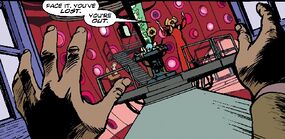
The Doctor and the TARDIS did fall out on occasion. It appeared to resist the Eighth Doctor’s efforts to go to the end of the universe after the deaths of Lucie and Alex Campbell, allowing the Time Lords to immobilise it. (AUDIO: The Great War) It also resisted his attempt to alter history by interfering with Robin Bright-Thompson's journey to Edinburgh, with him having to do multiple attempts to get it at the right place. (AUDIO: Crossed Lines) The TARDIS appeared to resist the War Doctor's plan to surrender to the Daleks in the Tantalus Eye, attempting to activate the engines and tolling the Cloister Bell. (PROSE: Engines of War) Feeling slighted by several misadventures that had messed with its form, and tempted by the Talent Scout in the guise of a Time Lord, the TARDIS abandoned and rejected the Eleventh Doctor and his companions for a time, until he was able to get through to it via Alice Obiefune's connection to the psychic circuits. (COMIC: The Comfort of the Good) When the Doctor attempted to pilot it to the site of his own grave on Trenzalore, the TARDIS forcibly shut down, halting itself in orbit above the planet. (TV: The Name of the Doctor) When he later put it up for auction as a distraction in the Obsidian Mainframe, the TARDIS barred him entry (COMIC: Pay the Piper) and appeared to go along with Danny Fisher’s plan to wipe out Cornucopia. Once the Doctor apologised it ended its cooperation with Danny, with the Doctor believing they had “talked it over”. (COMIC: The Blood of Azrael)
On several key occasions, the TARDIS's close bond with the Doctor proved to be decisive in interaction with other TARDISes. When the Seventh Doctor had the consciousness of a nascent TARDIS planted in his mind as part of a Time Lord experiment, not only was the new consciousness more stable than other such imprints due to his link to his own TARDIS, but another TARDIS-mind was later able to communicate with the Doctor's ship and use that insight to understand what they should do. (AUDIO: Unregenerate) When the Eleventh Doctor accidentally caused a Type 1 TARDIS to panic and unleash anti-time across the universe out of fear at the chaos it read from the Doctor's mind, the other twelve Doctors were able to convince the Type 1 to stop by linking it to their own TARDISes, the Type 1 accessing the TARDIS's databanks and convincing it that the universe was worth preserving. (COMIC: The Lost Dimension) Upon seeing a valley of dead TARDISes, the TARDIS mourned her "sisters", though nonetheless agreed to go along with the Doctor's plan to build a rudimentary console from their remains. (TV: The Doctor's Wife)
The TARDIS had varying opinions of the Doctor's companions. It considered most of them to be strays and usually couldn't even remember their names, calling Amy Pond "the orangey girl" and Rory Williams "the pretty one". (TV: The Doctor's Wife) The Sixth Doctor believed the TARDIS must have trusted Evelyn Smythe, after she successfully tampered with the time coordinates to stop him altering history on Világ. (AUDIO: Arrangements for War) When Frobisher abused the dimensional stabilisers to create holographic gumblejack fish to hunt, the TARDIS went “on strike”, in the Sixth Doctor’s words. It took them to Eugene’s World, seemingly to force Frobisher to learn a lesson about the value of simulated life. (AUDIO: The Holy Terror) The ship showed a particular liking to River Song, although this was mainly because the TARDIS was, in a way, River's second mother since it had given her Time Lord DNA when River was conceived inside it. (TV: Let's Kill Hitler)
The TARDIS had a tendency to be rather petty and spiteful to people it disliked. When Putta Pattershaun 5 entered the TARDIS, he sensed it disliked him. In order to upset it, he insulted the TARDIS, Gallifrey, Time Lords, and the Doctor. The TARDIS lifted him up into the air and flung him out the doors. (PROSE: The Drosten's Curse) The ship displayed a particular disliking for "impossible" companions, notably Jack Harkness and Clara Oswald, and it went to the end of the universe in an attempt to shake off Jack (TV: Utopia) and refused to open for Clara. (TV: The Rings of Akhaten, Hide) One night the TARDIS played an elaborate practical joke on Clara that involved scaring her with a holographic leopard in the bathroom and time-looping the human and preventing her from finding the bedroom — while at the same time meeting multiple versions of herself. (HOMEVID: Clara and the TARDIS) It also distrusted Charlotte Pollard during her paradoxical travels with the Sixth Doctor, witholding from her the protections from alien viruses that it usually afforded its occupants. This left Charley vulnerable to Mila. (AUDIO: Patient Zero) When the Spy Master took over the Doctor's body, the TARDIS gave him an electric shock upon touching the console however he threatened the ship into obedience. (TV: The Power of the Doctor)
The Doctor believed the TARDIS was simply slow to trust like a cat, (TV: Hide) and indeed the TARDIS did appear to warm up to Clara, to the extent that Clara was able to open the TARDIS doors with a snap of her fingers. (TV: The Day of the Doctor, The Caretaker) The TARDIS even extended its shielding around Clara to protect her through the Time Vortex when she hung onto the outside of the ship even though it meant it would take the TARDIS three hundred years to return to the Doctor. (TV: The Time of the Doctor) Later, the TARDIS even allowed Clara to pilot her on two occasions using a psychic link; on the first occasion this was at the Doctor's behest, but the second occasion occurred when the Doctor was incapacitated and at Clara's initiative, even though it resulted in Clara unintentionally transporting the TARDIS to Gallifrey early in the Doctor's life, despite the potential for a paradox to occur. (TV: Listen)
The TARDIS displayed a somewhat manipulative side. It claimed to have shaped the Doctors with “a lot of carefully accidental wrong turns”. When the Doctor created a Time Fracture by saving Adelaide Brooke, the TARDIS planned how it could use the Fracture to take the Doctor to the Dark Times so he could resolve his “unfinished business” there. It also gave Brian, an Ood who had fallen into the Time Vortex, “a nudge” in the belief he might be useful to the Doctor there. It wondered whether the Seventh Doctor would have been proud of her for this behaviour. (PROSE: What the TARDIS thought of “Time Lord Victorious”)
It also exhibited a rudimentary sense of humour. Whilst her mind was uploaded to the telepathic circuits, Lucie Miller heard some of the TARDIS’ thoughts, causing her to giggle. (AUDIO: Worldwide Web) The TARDIS later appeared to tease the Eleventh Doctor by choosing to display only images of attractive female companions to Amy Pond when ordered to exhibit past companions of the Doctor, causing him to chide it for not at least including "the tin dog". (HOMEVID: Meanwhile in the TARDIS) It did something similar when showing Clara Oswald images of past companions, including choosing a full-length image of Amy showing her legs as opposed to the simple portrait photos otherwise shown; this slideshow occurred after Clara deduced laughter coming from the console when she asked if she was the first girl to stay the night in the TARDIS. (HOMEVID: Clara and the TARDIS) The TARDIS also seemed to openly mock Clara by choosing Oswald's form for its holographic interface at one point. (TV: Hide)
The TARDIS appeared to be somewhat familiar with Earth culture, once comparing the Doctor's efforts to build a working TARDIS console to "a nine-year-old trying to rebuild a motorbike in his bedroom", though she was puzzled by the Doctor's reference to fish fingers. (TV: The Doctor's Wife)
While possessed by the Zagreus entity born of Anti-time, the TARDIS used an avatar appearance of the Brigadier to interact with the Eighth Doctor, Charley Pollard and Rassilon. Similarly to the Doctor during this infection, the TARDIS portrayed a twisted and evil personality, going as far as torturing the Doctor and shooting former companion Leela. It showed hatred towards the Doctor's companions, specially envying his love for Charley. However, her "good side" still tried to help the Doctor, by creating ways to stop the anti-time infection. (AUDIO: Zagreus)
Destruction
Over its long history with the Doctor, the TARDIS came to several ends where it was actually destroyed, either rebuilding itself later or stopping the damage from occurring in the first place through temporal actions. These "deaths" included;
- Having its power drained by the Tick-Tock World and shattering in a crash landing. (AUDIO: Tick-Tock World)
- Breaking apart while exposed to the forces outside the universe (TV: The Mind Robber)
- The internal dimensions collapsing due to missing components (AUDIO: Time Reef)
- Burning in time spillage from a vortex rupture; this assault was averted before complete destruction but still required the ship to rebuild itself (PROSE: The Crystal Bucephalus)
- Being broken apart by the gravity manipulations of Tractators, requiring the Gravis to pull it back together (TV: Frontios)
- Shattering across the infinity of time for a second due to a temporal explosion (AUDIO: Paper Cuts)
- Reforming into a SARDIT after colliding with the Time Scaphe and being invaded by the Process (PROSE: Cat's Cradle: Time's Crucible)
- Being time rammed by an alternative TARDIS on the Silurian Earth, (PROSE: Blood Heat) only escaping due to a Fortean Flicker displacing it just before destruction. (PROSE: Happy Endings)
- Being anchored in 2044 whilst Elizabeth Klein was attempting to use it to travel to 2144, resulting in the internal dimensions of the TARDIS being torn from its external dimensions, turning it into an ordinary police box. This was undone when Klein was erased from history. (AUDIO: The Architects of History)
- Being torn apart after being caught in a dimensional rift leading between Earth and Avalon, (PROSE: The Shadows of Avalon) caused by her sister Lolita in revenge for rejecting her alliance and starting her own generation of 103-form timeships through the Doctor's companion Compassion. (PROSE: Toy Story, The Book of the War) The TARDIS was only able to restore itself by latching on to I.M. Foreman's bottle universe, but the Faction Paradox biodata virus mutated it into the Edifice until the Doctor drained its power. (PROSE: The Ancestor Cell)
- Being erased from existence by a conceptual bomb, until the Doctors managed to avert the circumstances that led to the bomb being deployed against them in the first place. (AUDIO: The Light at the End)
- Being drained by the Ravenous, resulting in it crashing in London in 2020 and the interior collapsing, with the ship appearing to be a normal police box for weeks. (AUDIO: Day of the Master, Lost Property) The TARDIS was eventually able to begin to restore itself by latching on to a paradox triggered by Rarkelians killing the Doctor. (AUDIO: Divine Intervention)
- Exploding after being aboard a spaceship which collided with a space station's reactor. This was undone when Helen Sinclair used time travel to ensure the Doctor departed the spaceship prior to the collision. (AUDIO: Get Andy)
- Being attacked by one of the Barber-Surgeon's creations, leaving the ship dead. (AUDIO: The Abyss) The Barber-Surgeon being erased from existence undid this event, restoring the TARDIS. (AUDIO: The Horror)
- Colliding with an Acari ship which caused the fifth dimension to split in two, triggering distortion which tore apart the ship. The Tef’Aree returned Emily Winter to the TARDIS a few seconds before it was destroyed, enabling her to prevent the event. (COMIC: Tesseract)
- Exploding and causing the Time Field after being taken over by the Silence. It was restored after Big Bang Two. (TV: The Pandorica Opens/The Big Bang, The Time of the Doctor)
- Having the engines explode upon collision with the salvage ship whilst the defences were down. However, the TARDIS froze the explosion by "wrapp[ing] her hands around the force" to give the Doctor time to resolve the issue, by using a rift created by the collision to warn his past self prior to the explosion. (TV: Journey to the Centre of the TARDIS)
The Supreme Dalek ordered the destruction of the TARDIS, but it survived using its Hostile Action Dispersal System. (TV: The Magician's Apprentice / The Witch's Familiar)
Alternate versions
Alternate timelines
In an altered state of reality, the Doctor owned a TARDIS which was a "family heirloom". (PROSE: The Infinity Doctors)
In an unstable mini-universe created by the Monk, (PROSE: No Future) the Doctor's TARDIS shutdown after the Third Doctor's death at Wenley Moor. It was revived by Ace from the main timeline and used by the Seventh Doctor as his TARDIS had been lost in a tar pit. The Doctor used it to time ram his original ship to destroy the alternate timeline and continued travelling in it, believing his TARDIS destroyed. (PROSE: Blood Heat) Initially this TARDIS' chameleon circuit was working again, however the Doctor eventually chose to deliberately break it again to keep the TARDIS in the police box shape. (PROSE: No Future) The Doctor travelled in this TARDIS until being reunited with his original at Bernice Summerfield's wedding, giving the alternate version over to Muldwych. (PROSE: Happy Endings)
In an alternate timeline where the Fourth Doctor and Romana II died on Veridis, the TARDIS began dying, with roundels cracking, the food machine breaking down and rooms disappearing. After some weeks there was nothing left. (AUDIO: A Full Life)
In an alternate timeline created by the Seventh Doctor and Ace's capture at Colditz in 1944, the Nazis captured the Doctor's TARDIS in 1962, shooting the Doctor when he emerged from the ship at a checkpoint. The regenerated Doctor manipulated Nazi scientist Elizabeth Klein, who was studying the TARDIS, into using the ship to travel back to 1944, having pre-programmed it to abandon her upon taking her there. (AUDIO: Klein's Story)
In an alternate timeline created by Elizabeth Klein repeatedly changing history, the Doctor was sent to stop her by the Time Lords in a TARDIS which was capable of erasing her from history. This TARDIS had black walls and low lighting and was able to disguise itself using a perception filter. (AUDIO: The Architects of History)
A Ninth Doctor, who was a possible future of the Eighth Doctor, (PROSE: The Tomorrow Windows) travelled in the TARDIS with the Master who by that point inhabited an android body. His TARDIS' control console was round with panels set around it with mostly brass-like controls. There was a large section of technology set atop the central column that, whilst dematerialising, moved up and down. Additionally there was a Zeppelin hangar, in which the Master would occasionally leave the Doctor's umbrella stand. (WC: Scream of the Shalka)
In a parallel world, Rose Tyler believed that the TARDIS was dying due to the Doctor's death. Indeed, the TARDIS seemed to be in bad shape though it continued to try to help. (TV: Turn Left)
In the alternate timeline where the Doctor died on Trenzalore, the TARDIS itself was dying as well, presumably due to the Doctor's death and had grown to a giant size due to a "size leak" and acted as his tomb on the ruined planet. Its console room was overgrown and the console replaced by a bright light that was a scar allowing access to the Doctor's time stream. It was infiltrated by the Great Intelligence who subsequently lured the Eleventh Doctor and Clara Oswald there, using them to access the control room to enter the Doctor's time stream. (TV: The Name of the Doctor)
In a timeline visited by Same and Different, the Fifth Doctor had perished trying to stop the Cybermen in Agrippina Primus. A billion cybermites made for the grieving TARDIS prompting it to deactivate its chameleon circuit. Swelling to its true planetary size, the TARDIS' self-repair systems began fighting against the Cyberman infection. In another timeline, the TARDIS had been possessed by a malevolent hunger, the Doctor rallying an army to hunt and destroy the TARDIS, the two mutually slaying one another in the light of a dying sun. Same and Different harvested various pieces of the TARDIS from various timelines to build their paradox TARDIS only for the Thirteenth Doctor to force the machine out of existence. (PROSE: The Paradox Moon)
Parallel universes
In one parallel universe, the Doctor made to steal a TARDIS but was prevented from actually leaving by Quences. The Doctor lived inside the TARDIS for years, unaware of its true nature, until Susan helped him overcome Quences' deceptions. He subsequently departed Gallifrey in the ship, (AUDIO: Auld Mortality) and travelled freely through time and space in it. (AUDIO: A Storm of Angels)
In the Unbound Universe, the Unbound Doctor also travelled in a TARDIS which became stuck in the shape of a police box. After his trial at the hands of the Time Lords, the TARDIS was fitted with an inhibitor, limiting it to moving only in space, and brought the Doctor to his exile in Hong Kong. The Doctor was able to overcome the inhibitor using a nuclear explosion, (AUDIO: Sympathy for the Devil) and resumed his travels across the universe in the ship, accompanied by Alistair Lethbridge-Stewart. (AUDIO: Masters of War) After the Great War, the Doctor attempted to use the TARDIS to escape to Bernice Summerfield's universe, but failed. He and Benny travelled together in the exhausted TARDIS, (AUDIO: The Library in the Body, Planet X, The Emporium at the End) eventually using the power of the Great Old Ones to enable the ship to reach her universe. (AUDIO: The True Saviour of the Universe)
In another parallel universe, the Doctor became separated from the TARDIS at the DEEP. Decades later he returned to reclaim it, but was shot and killed before he could retrieve the ship. (AUDIO: Full Fathom Five)
In one parallel universe, the Doctor left the TARDIS behind in a field after deciding to hide on Earth to escape the Time Lords, removing its Time Vector Generator. After being caught she was imprisoned in her TARDIS after her sentence was increased due to her escape attempt. She was told that if she attempted to use the controls to escape the ship would dematerialise permanently, erasing her, however a letter from a Time Lord claimed this was not the case and she could escape. The Doctor chose to set the controls, wondering if the letter was actually true. (AUDIO: Exile)
In the Warrior's universe, a version of the TARDIS was owned by an aberrant version of the Sixth Doctor created among the millions of timelines caused by the Warrior's interference in the creation of the Daleks. The ship was destroyed trying to escape the time bullets fired by Miss Brown to kill the aberrant Doctor. (AUDIO: Dust Devil)
Aliases and nicknames
| Name | When used/given | Story | Etymology |
|---|---|---|---|
| The Blue Box | The Fires of Pompeii | ||
| Idris | The name of a humanoid individual who was used as a host for the soul of the TARDIS. | The Doctor's Wife | |
| Sexy | Given by the Eleventh Doctor. | The Doctor's Wife | |
| The Ghost Monument | Given by those local to Desolation. | The Ghost Monument | |
| Montgomery Blue Box | Given by historians after it landed in Montgomery, Alabama, in 1955. | Alabama's Blue Box, The Lonely Assassins [+]Loading...["The Lonely Assassins (video game)"] | |
| The Leadworth Locker | Given by the people of Leadworth after it was seen around the village for a few years. | Alabama's Blue Box |
Behind the scenes
- The importance of the TARDIS to the Doctor Who franchise was recognised in late 2009 when the BBC unveiled a new version of the Doctor Who logo which entered service in 2010; the logo incorporates the initials DW formed in the familiar police box shape of the Doctor's TARDIS.
- Although the TARDIS has been a constant presence in the television series since 1963, it has almost always been essentially a mode of conveyance, with the majority of stories taking place away from the vessel. There have been a few exceptions, such as The Edge of Destruction and Time Crash in which the entire action of a story takes place within the TARDIS. Amy's Choice also falls into this category, although given the illusory nature of the story, much of it was filmed on locations and sets other than the actual TARDIS. The Invasion of Time was the first story to give viewers an extensive tour of the bowels of the TARDIS (other than occasional glimpses of individual rooms); a more modest "tour" occurred in Castrovalva. Viewers also saw new aspects of the TARDIS in the 1996 TV movie. In the comic strips, several stories have taken place almost entirely within the TARDIS, including Changes and Tesseract. In the television story The Doctor's Wife areas were used by the antagonist to try to trap or kill the occupants; this episode marked the first time since the series had returned to television in 2005 that extensive areas beyond the control and wardrobe rooms were explored on screen. Later, Journey to the Centre of the TARDIS gave an extensive tour of the TARDIS.
- The Doctor's TARDIS appeared in the video game Fallout in a random encounter.
- The Doctor's TARDIS also appeared in the 2013 video game Call of Duty: Ghosts as a trophy stating "awarded for the largest interior with the smallest exterior."
- The TARDIS has appeared in every televised Doctor Who story with the exception of Mission to the Unknown, Doctor Who and the Silurians, The Mind of Evil, The Dæmons, The Sea Devils, The Sontaran Experiment, Genesis of the Daleks, Midnight, The Lie of the Land, and The Woman Who Fell to Earth. A hallucination of the TARDIS interior appears in Heaven Sent, but not the actual TARDIS.
- The characteristic wheezing noise of the dematerialising TARDIS is made by scraping a key against a piano wire.
- The TARDIS makes a brief cameo in Chelmsford 123 when it materialises in the background; the Doctor exits to have a look around before reentering the TARDIS and dematerialising.
- The TARDIS cameos in The Legend of Dick and Dom: when Dick & Dom are travelling through the mists of time, the TARDIS is seen in the background.
- The TARDIS cameos in Iron Sky: while the Moon Nazis' ships approach Earth, it is seen flying by quickly.
- In a deleted scene from Journey's End, the Doctor gives the Meta-Crisis Tenth Doctor a chunk of TARDIS while Donna tells them a fast way of growing one.
- Neil Gaiman, writer of The Doctor's Wife, writing in The Brilliant Book 2012, indicated that Idris/the TARDIS was at one point also scripted to remark that it chose to remain in the police box form, not because of a broken chameleon circuit, but because the Doctor liked it. It also was to have qualified it calling Rory "pretty" and Amy as "the orangey girl" by stating it rarely remembered the names of the Doctor's companions.
- Suranne Jones' performance as the TARDIS in The Doctor's Wife marks one of only a handful of occasions that an actor has portrayed an actual vessel and its consciousness. Prior to this episode, Nicholas Courtney portrayed the TARDIS infected by anti-time and acting of its own free will in the form of Brigadier Lethbridge-Stewart in AUDIO: Zagreus. The TARDIS' interface, which allows limited direct communication, later allowed two other actresses to portray an aspect of the TARDIS: Caitlin Blackwood in TV: Let's Kill Hitler as the interface takes the form of young Amelia Pond; and Jenna Coleman in TV: Hide as the interface takes the form of Clara Oswald.
- The scene in the TV story Terror of the Autons where the Third Doctor mentions his TARDIS' and the Master's TARDIS' models of dematerialisation circuits turns out differently in the novelisation Doctor Who and the Terror of the Autons. In the novelisation, the Doctor specifies his TARDIS as "one of the original Mark One's [sic]", while the Master's TARDIS is "one of these flashy Mark Two jobs", and that this is the reason why the two circuits are not interchangeable.
- The TARDIS is both an ally and an enemy in the Doctor Who: Legacy mobile game. In addition, a special Doctor-like ally called "A Mad Man with a Box", which has an appearance of the TARDIS was created for one of the anniversaries of the game.
- In the online game Wizard101, a special event (known as the "Five B.O.X.E.S.") features Doctor Who themes: it revolves around players assisting a character known as "The Professor" (a parody of "The Doctor"), who owns the "B.O.X." (a red-coloured TARDIS, disguised as a 'Telegraph Box'), with combating a villain called "The Maestro" (a parody of "The Master"), who seeks to disrupt the present by changing the past.
- In older episodes of Doctor Who, especially from the First Doctor's era, characters often refer to the TARDIS as just "TARDIS" without "the," as if it is a proper noun, such as "Use TARDIS" and "TARDIS is." Often, even within the same episodes, other characters say "the TARDIS."
Footnotes
- ↑ While Blink itself uncontroversially sets its main setting in 2007 and "twenty minutes to Red Hatching" a year later in 2008—as Kathy Nightingale's letter describes taking "one breath in 2007 and the next in 1920", and the Tenth Doctor's side of his conversation with Sally Sparrow in 1969 happens 38 years before Sally says hers—these are contradicted by heavily conflicting dates in the Redacted audio series later on regarding both Kathy's disappearance and the Red Hatching. In Angels, Abby McPhail identifies 2008 as the year of Kathy's disappearance, which suggests 2009 as the year of the Red Hatching. In Salvation, the Thirteenth Doctor recognises the Red Hatching as the cause of death of Andy Proctor, who was last seen by his daughter Cleo "nearly 20 years" before 2022 according to Recruits.
External links
- The TARDIS at the Faction Paradox wiki
- The Mind Robber - The Sound of the TARDIS: A History
- The TARDIS at the Doctor Who Legacy wiki
- A Mad Man with a Box at the Doctor Who Legacy wiki
- TARDIS at the LEGO Dimensions wiki
| ||||||||||||||||||||||||||||||||||||||
| ||||||||||||||||||||||||||||||||||||||||
| ||||||||||||||||||||||||||||||||||||||||||||||||||||
| ||||||||||||||||||||||||||||||||||||||
